#despite most of them being monolingual
Explore tagged Tumblr posts
Text
A random list of TWST HCs in no particular order
(Keep in mind they can range from general, fluffy, or angsty)
- Sam is bilingual but he speaks the Port O' Bliss (Louisiana) Dialect of French. He also would call Crowley a coullion/couyon (don't know the proper spelling. Sorry!) under his breath whenever that old crow is just yapping instead of paying for his order.
- Malleus had his mind blown when he first heard about milkshakes. I mean you can drink ice cream?! THROUGH A STRAW?! 🤯
- The only time you will ever hear Crewel call himself "daddy" is whenever he gets caught baby talking towards his dogs. Not that he has any shame in doing it.
- Jamil would slip into his mother tongue whenever he gets SUPER pissed off (it's not often when he does but 0/10 would not recommend you do it)
- I pretty much HC a good majority of the twst cast to be bilingual or know a few languages depending on where they come from. Although if they're from the Queendom of Roses, I mainly see them being monolingual but have the ability to read other languages.
- Rollo has vivid nightmares about his brother's death and how he ultimately blames himself for what happened. It's so bad to where the poor boy would rather not fall asleep so he won't see the visions again. The best sort of night is where he doesn't dream. There's nothing but the black void when he closes his eyes.
- I feel like Lilia would be sad hearing the song "Army Dreamers" because it would remind him so much of the war and the many soldiers that died serving Briarland. They were someone's child after all.
- Speaking of Lilia, he can turn on the old soldier voice and it's the one way he knows how to scare the shit out of some of the former soldiers that served with him. However, he would say
"I've spent so long playing soldier that I'm kind of tired of it."
If you ask him why he stopped using that voice. God... Malleus, Silver, and Sebek did a number on that old man.
- If I were to make a guess on Gidel's age, I think he would be around 9 or 10 years old. So it's safe to say that Fellow probably found him when he was either in his late teens or early twenties. Though, I'm more leaning on early twenties for this.
- I got PLENTY of hcs surrounding those two but much like most of the cast, Fellow himself is bilingual and learned the common language through his travels (mother tongue is Italian of course). Despite his limited education, he does try to help Gidel learn how to read and write as best as he can. Gidel is also his biggest priority. I don't think he really minds what happens to him as long as Gidel is happy, has food in his stomach, and his clothes are well mended but Gidel in turn knows how much Fellow has been suffering for their sake.
- Gidel also understands Italian but also the common language as well. Due to his limitations with reading and writing, one of the ways he is able to overcome the barrier when it comes to communication is miming or nodding and shaking his head. Sometimes what he's trying to say does get lost in translation but he and Fellow have such a tight knit bond that his big brother can understand him perfectly and can translate what he's saying if someone is having difficulty understanding him. He is a very streetwise kid underneath that adorable smile but is also a rather sensitive individual and can feel when someone is in pain or unhappy especially if it's Fellow
- A favorite story of our favorite scheming duo is "The Emperor's New Clothes"
- Yuu/MC has a tradition of welcoming the Halloween guest characters as honorary members of Ramshackle Dorm by making them perform a hazing ritual of having them take care of Grim when it's his bath time. Grim's a little bastard about it too especially towards Fellow and Rollo (I'm unsure about Skully but I'll update once the event is complete).
- Azul is the worst person to play Monopoly against
- I feel like the Tweels would sing a jazzy version of "People = Shit" with Azul playing the piano but the more he heard the two chaos gremlins sing, the more he wanted to crawl into an octopus pot
- Pre-overblot Riddle would definitely have a stroke reading The Cat in the Hat especially since the moral is that sometimes a little rule breaking is fine as long as it doesn't go too far
- If you think Azul is the most annoying person to play Monopoly against, Ace would know all the ways to piss you off in Uno. I think the first years playing Uno would be both one hilarious sight to witness but also the worst because of how much those boys are going to be fighting with each other.
- Despite Grim saying he's not a cat, his cuddles and purrs can soothe one's soul despite how much he's a little bastard most of the time. It's little moments like these where the MC thinks it's worth it putting up with his attitude and his black hole of a stomach
- Dylla was definitely a delinquent in her youth and the apple didn't fall far from the tree when it came to her son. Although her son may struggle in terms of academics, the fact that Deuce is trying to clean up his act and reform is something that always makes her swell with pride.
- If Maleanor were still alive, she would've been the CUTEST grandma! Although I do think that the fact that her son is close friends with a human does make her feel uneasy because she doesn't want him to get hurt like how humans have hurt her. Although I do also think that Lilia would often visit her grave and tell her of the many milestones that happened to him and her son.
- Despite the fact that Trein's daughters are all grown up, they still keep in contact with their father to make sure he's doing okay and their conversations can get LONG but I don't think the professor minds at all. Any time he spends with his children whether he's home or on a call, he treasures it.
- I feel like knowing that Crowley likes wild game and Vargas himself is a hunter, I wouldn't be surprised if he took the headmage on a hunting trip. I also think that Vargas would give the fur to Crewel if he needs some material. The man may be a muscle head but he's not wasteful when it comes to hunting for game meat.
#twisted wonderland#disney twisted wonderland#disney twst#twst#twst thoughts#twisted wonderland headcanons#twst hcs#I may do a part two to this mainly for the staff and the Halloween guest characters#i may also do other parts the more I get to know some characters mainly because Diasomnia's my bread and butter
51 notes
·
View notes
Text
all my mandarin dictionaries (and dictionary-adjacent books)
Through chatting with @don-dake and @cherrymintvampyyri, I've come to realize that I might own a less than normal number of Mandarin dictionaries. So, here's a post about all of them.
I do have two basic bilingual dictionaries (Mandarin/English): the Langenscheidt pocket dictionary and the DK visual dictionary. These are quite easy to buy and not that interesting imo, so I'm not gonna talk further about them.
I'm also going to include a couple books that aren't technically dictionaries, but are rather about etymology of characters, and that's close enough to count for me.
Okay, let's get on to the interesting stuff!
1. What Character is That? An Easy-Access Dictionary of 5,000 Chinese Characters by Ping-gam Go (second edition, 1995)
bilingual
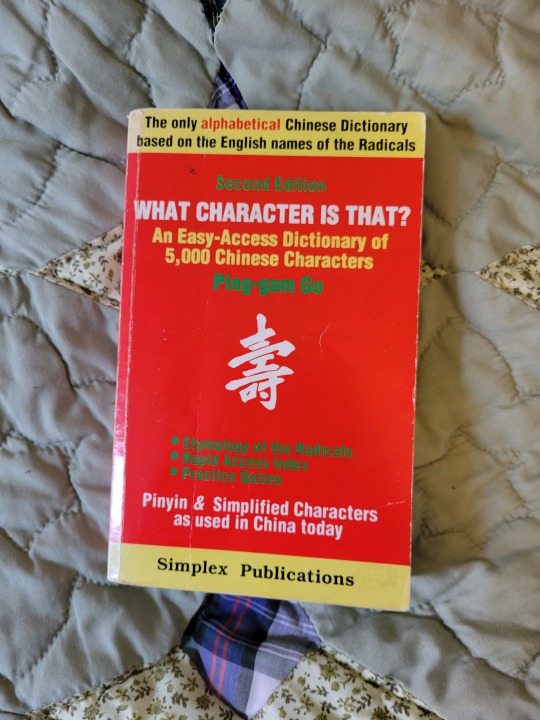
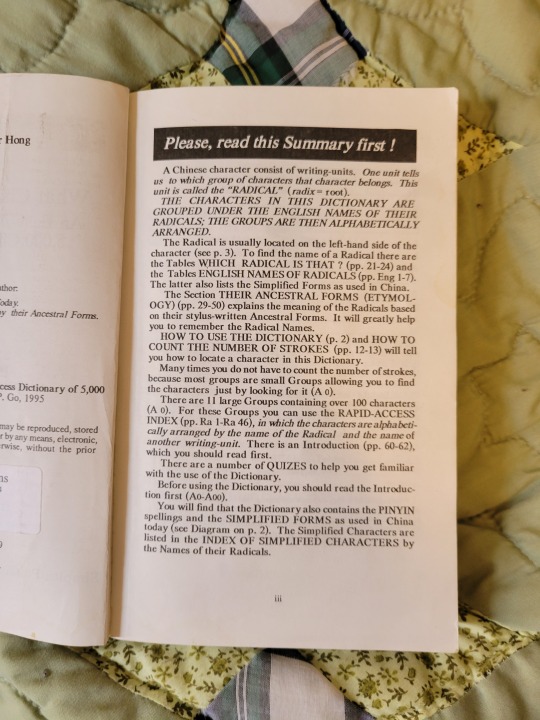
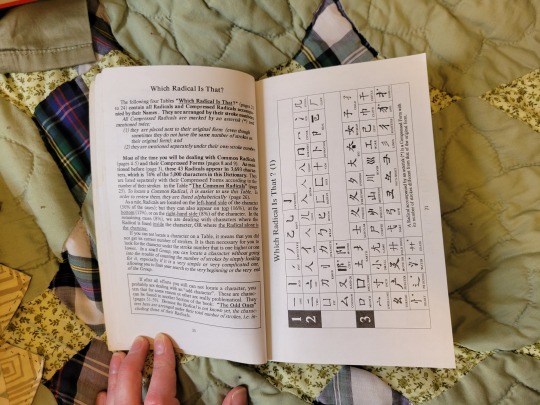
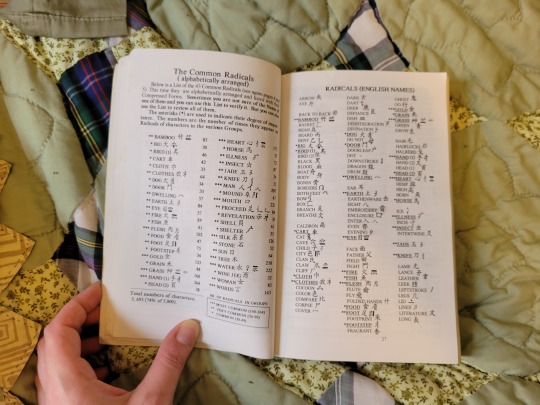
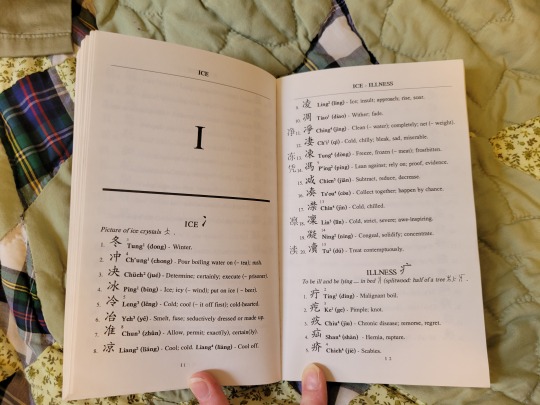
This strange little dictionary was gifted to me by a nun who went to high school with my grandma and later lived in China as a missionary. It's organized alphabetically based on the English translation of each radical?
I have not used this dictionary for actual reference ever, because I flipped through it once and realized that it was absolutely whack. But it's cool to have I guess.
2. 新华字典 第11版
monolingual
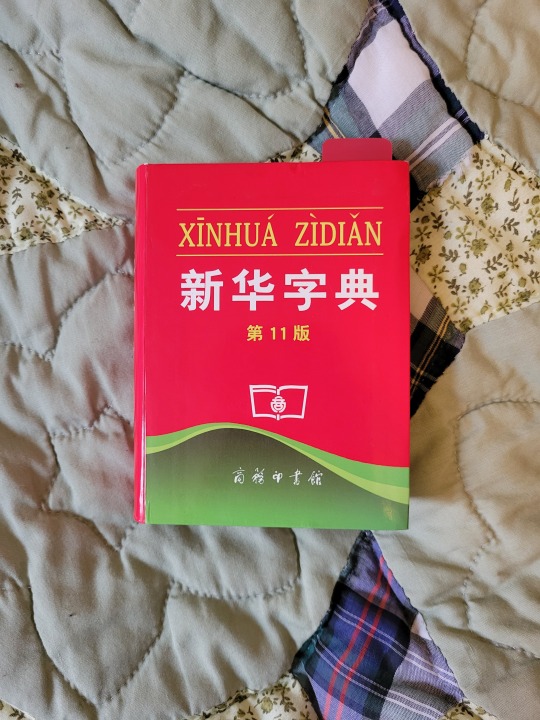
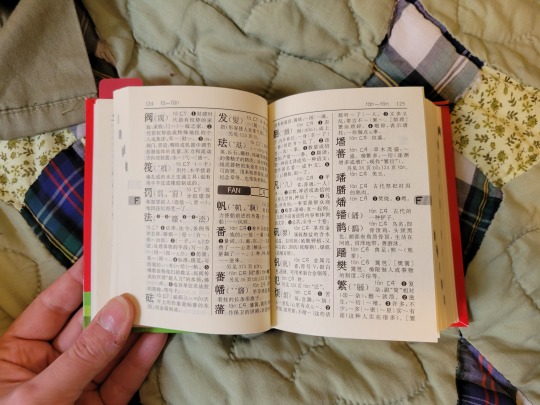
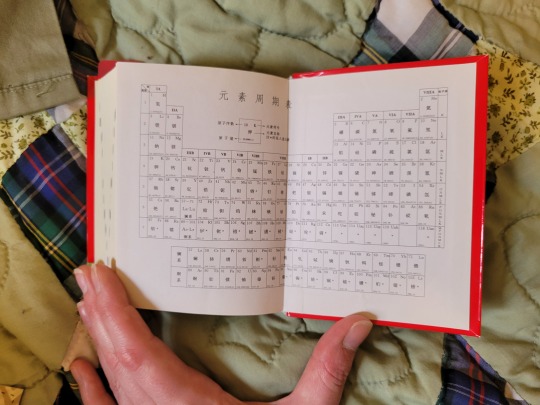
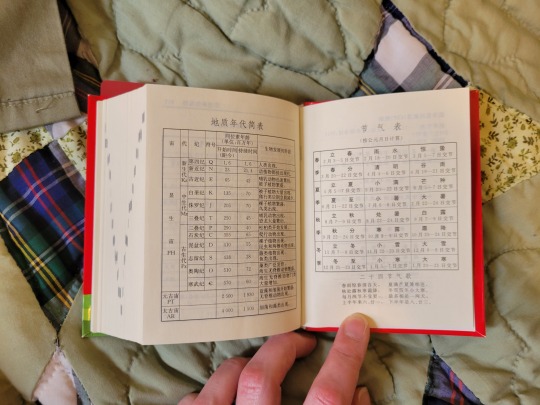
This little guy was gifted to me by a Chinese classmate back when I was in college. It's a 字典, so it's just focused on defining individual characters and providing some words featuring that character. Despite being a mainland dictionary, it also has 注音 next to each character for some reason.
It's got some neat stuff towards the back, like the periodic table and a chart of all the 節氣 solar terms.
3. 小学生全笔顺 同义词 近义词 反义词 组词 造句 成语 多音多义字 词典
monolingual
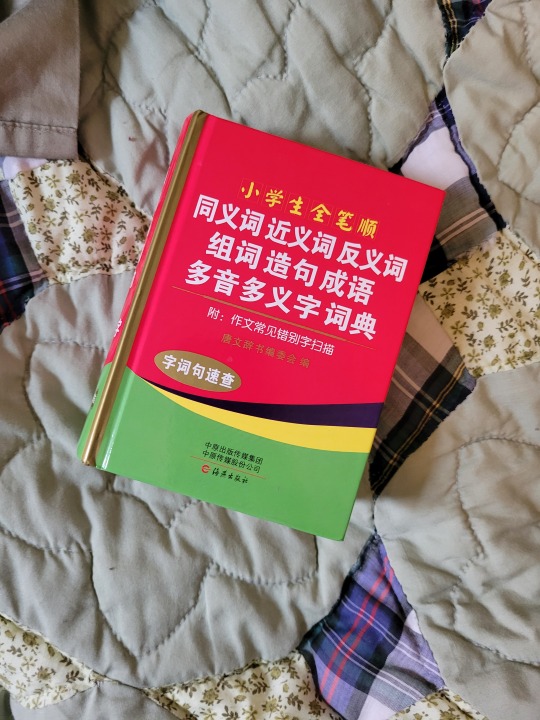
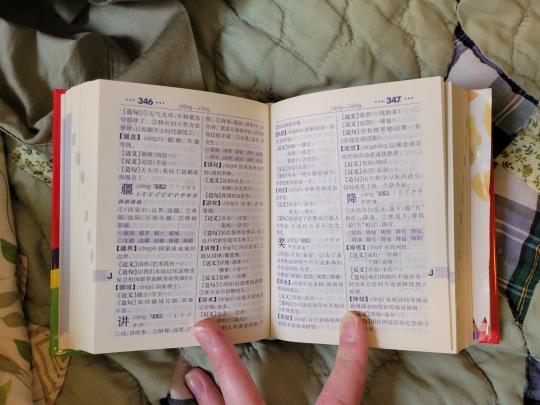
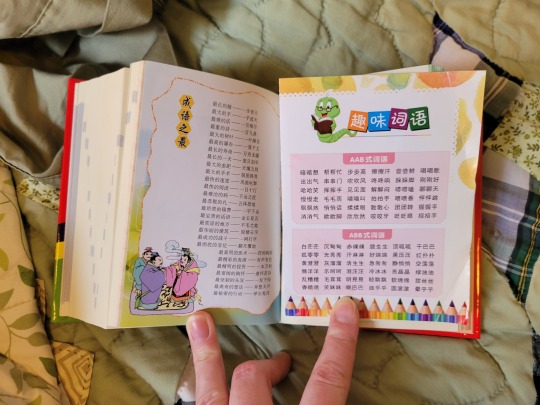
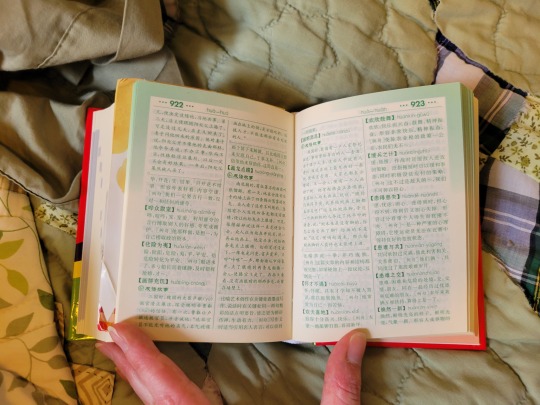
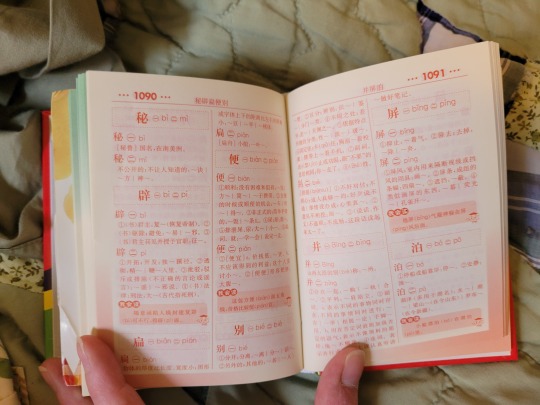
Whew, that's a mouthful. This is an actual 词典, so it defines full words. It also provides example sentences, synonyms, antonyms, and close equivalents. Then there's a section for idioms, and another section for 多音多义字.
There's also this nifty little insert with examples of words/phrases that follow common patterns of repetition.
4. 新现代汉语词典
monolingual
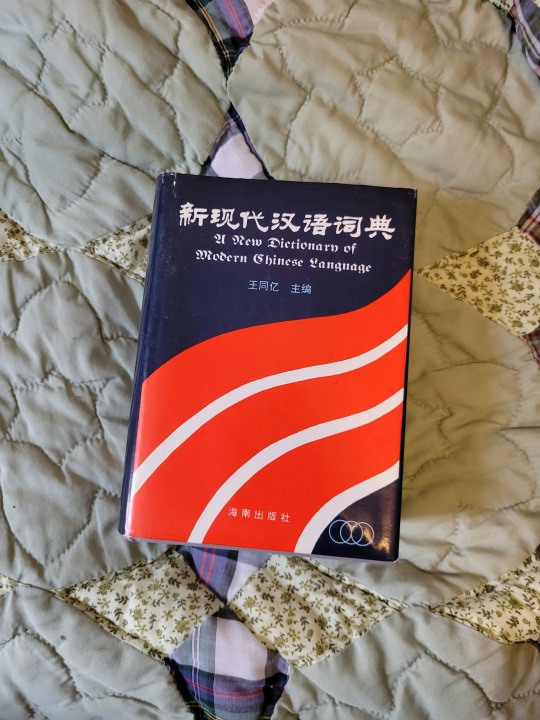
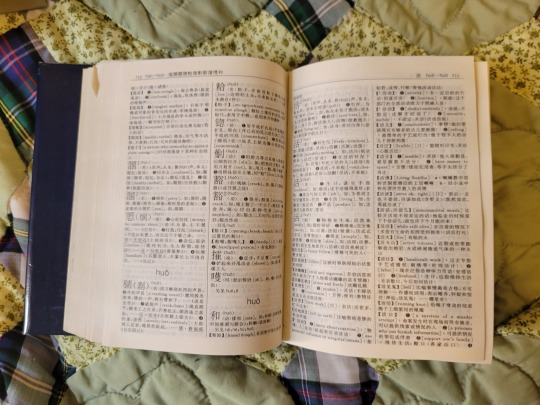
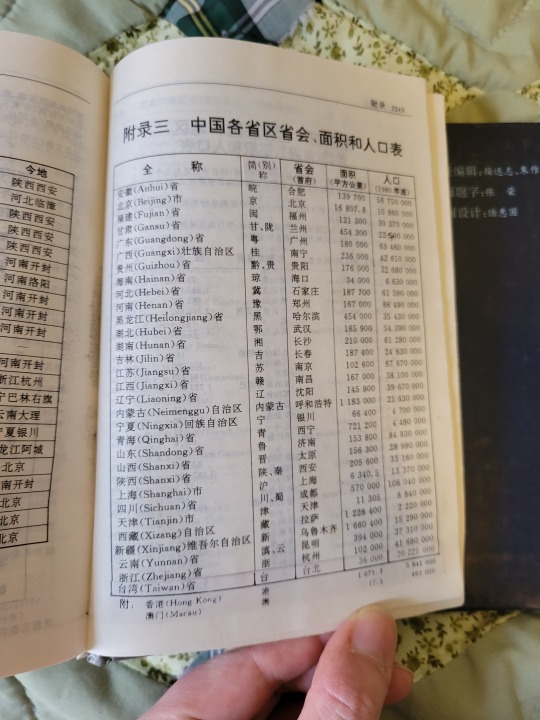
I picked up this chunky guy from a used bookstore down the street from me (the owner of the store passed last year, and the store is no longer there unfortunately). This is a fairly normal dictionary, it's just bigger than my others and has more words listed in it.
One thing I also noticed is that this chart towards the end of the dictionary apparently had a strip of paper pasted on the bottom. It doesn't seem like something I can peel up without damaging the paper under it, and when I shine a flashlight through the page I can't make out any major differences between what's on the sticker and what might be on the page under it. So my best guess is there might have been some damage to the text on the page?
5. 商务馆学汉语近义词词典 The Commercial Press Guide to Chinese Synonyms
monolingual
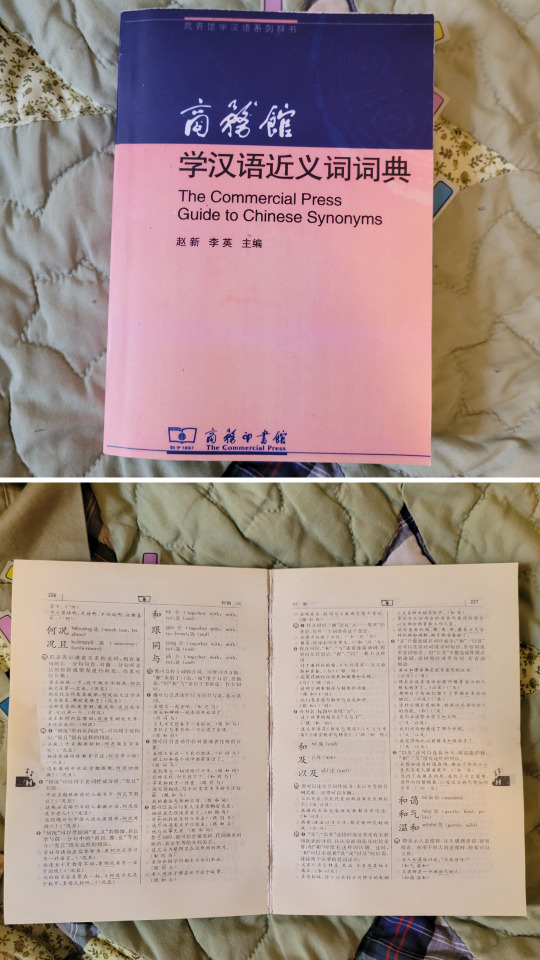
This book is easily the one I reference the most. As the name suggests, the book is all about synonyms. It takes sets of 2+ similar words and thoroughly explains the similarities and differences between them all. There's plenty example sentences, with notes about whether the synonyms can be used interchangeably in certain contexts.
It's a great resource, but I had a bit of trouble getting my hands on a copy. It's possible that in the years since I bought it there have been more copies made available for sale though.
these next two are books I haven't explored too much since they are old and the binding is incredibly fragile and starting to fall apart. just opening them is stressful.
6. 漢字分解 Chinese Characters Explained by F.X. Keelan (aka 康愛玲修女) (1967?)
bilingual
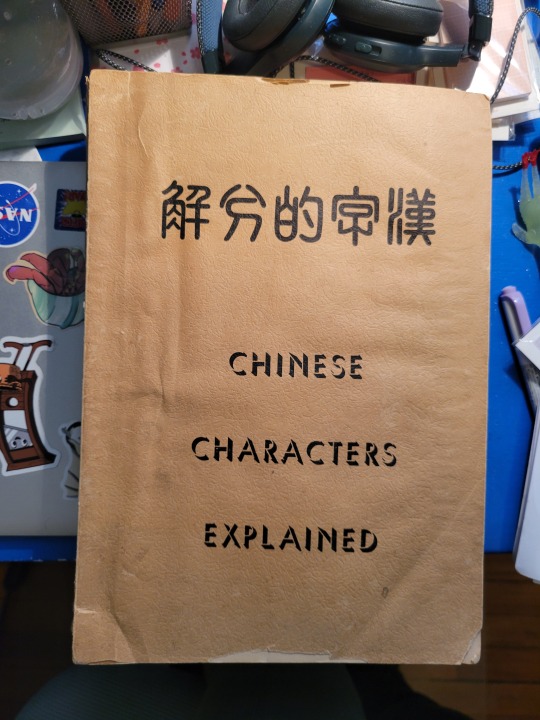

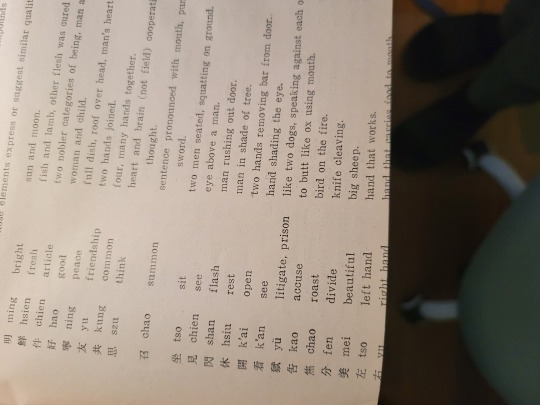
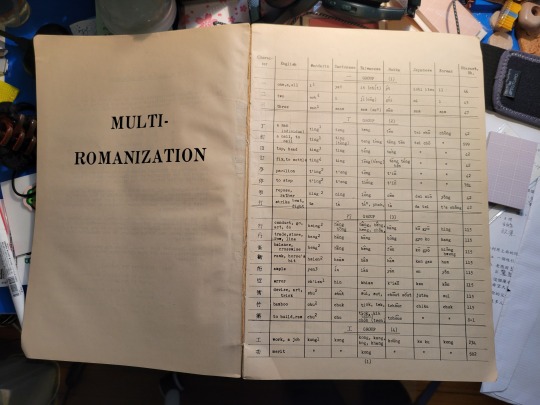
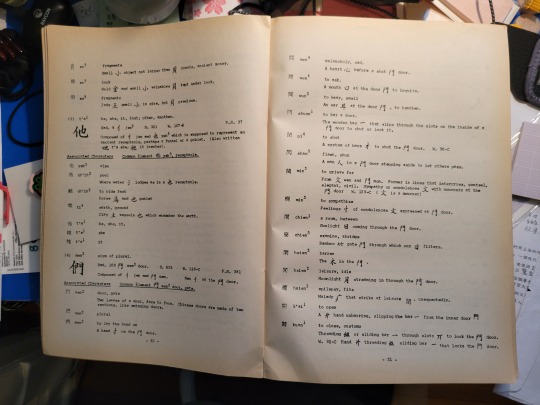
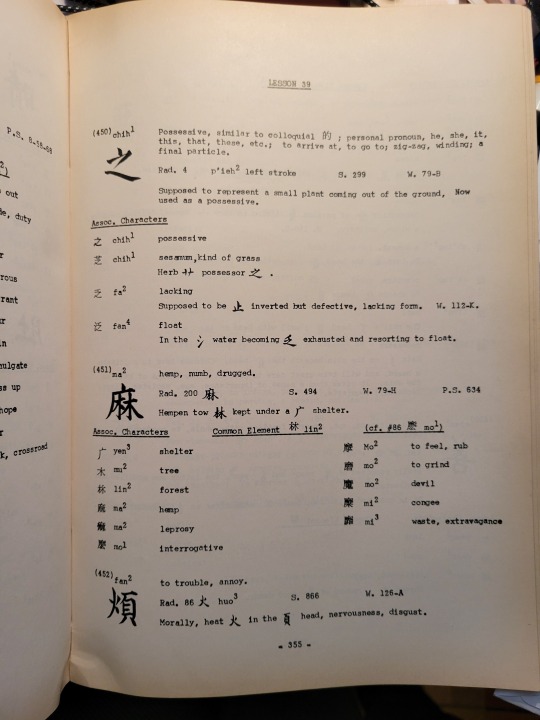
This book was also gifted to me by the nun who went to school with my grandma, and appears to also have been written by a nun! Based on what I've found from Google, this book was published in 1967.
Rather than a dictionary, this book is "a compilation intended as an aid in grouping and remembering [Chinese characters] with a view in acquiring a reading knowledge of Chinese"(p. iii). It aims to break down characters into radicals and giving similar/related characters. It's apparently the final installment in a 4 part Mandarin Course.
This book uses traditional characters. According to Google Books, the publisher is 光啓出版社, which is a Taiwanese organization. The book includes a very long table that has Mandarin, Cantonese, Taiwanese, Hakka, Japanese, and Korean pronunciations for (what seems to be) every character mentioned in the book. The intro mentions that this is so the course is more "accessible" for speakers of other East Asian languages.
Also, look at that printing error in the third photo! The text got cut off at the bottom of the page.
7. The Structure of Chinese Characters by John Chalmers (second edition, 1911)
bilingual
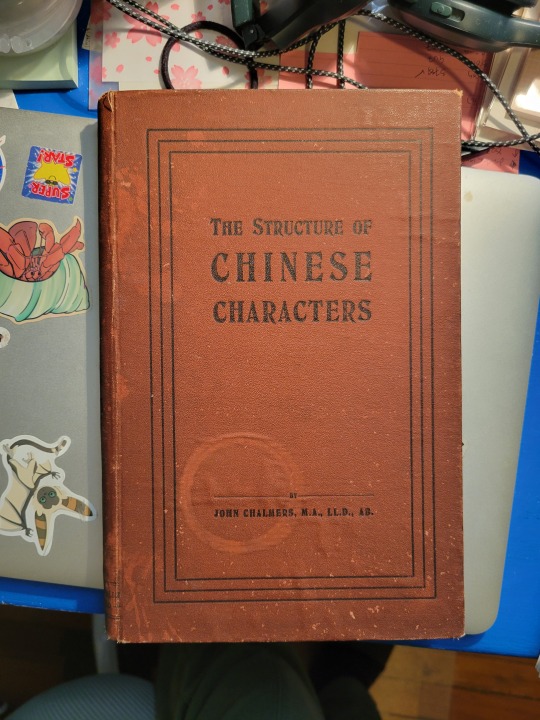
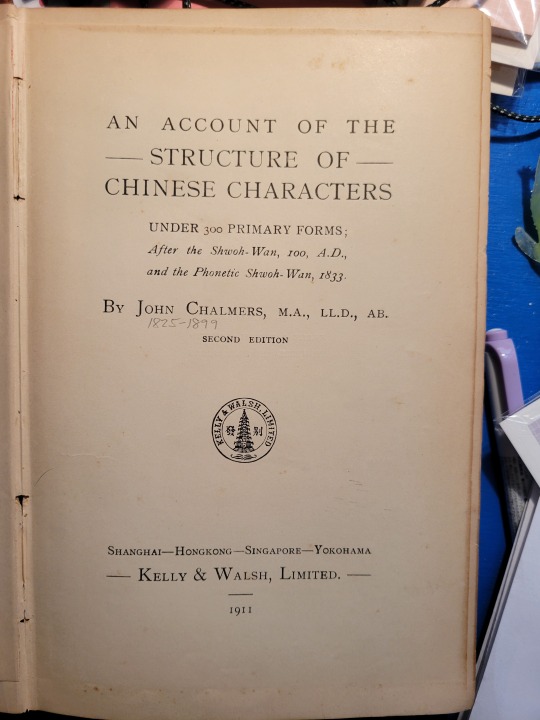
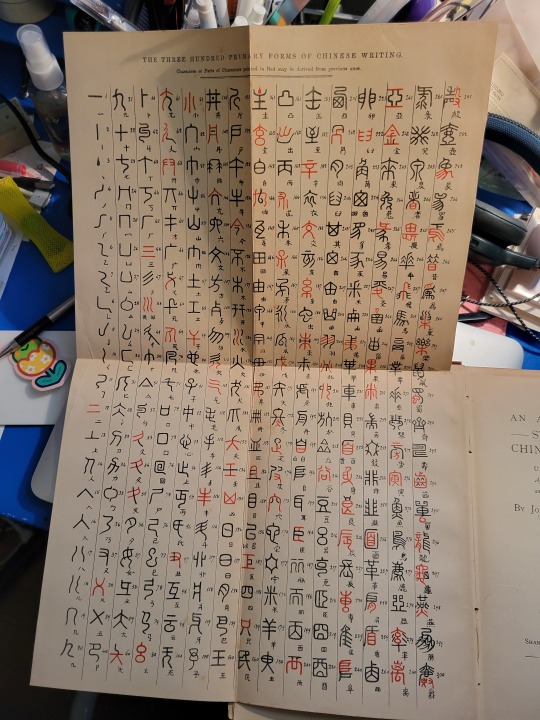
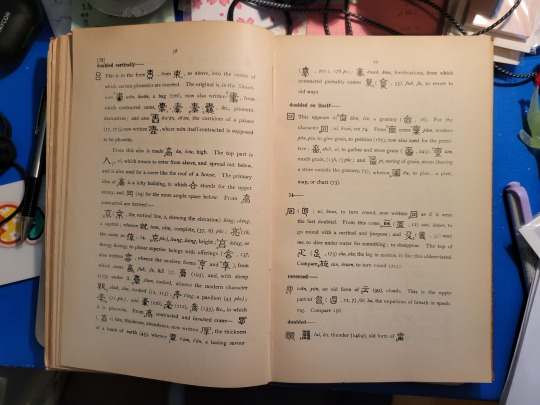
This final book is the oldest of the bunch, and was gifted to me by my boss's boss for some reason? She found it in a used bookstore apparently.
This book also uses traditional characters, because simplified characters just weren't a thing yet in 1911. This book is falling apart, and opening it stresses me out. It creaks whenever I open it.
Going by the title page, the full title of this book is An Account of the Structure of Chinese Characters Under 300 Primary Forms; After the Shwo-Wan, 100 A.D., and the Phonetic Shwoh-Wan, 1833. It was published by Kelly & Walsh, which was a Shanghai-based publisher.
Someone very kindly penciled in the years the author was alive: 1825-1899. John Chalmers was apparently a Scottish missionary (bc of course he was) who apparently popularized the term "Cantonese". This book that I own in particular was originally published in 1882.
It is, as the very long title suggests, an analysis and etymology of 300 common components
It also has a nifty fold-out of all 300 "primary forms" in seal script.
95 notes
·
View notes
Text
2024 Book Review #36 – Life Does Not Allow Us To Meet by He Xi

I read this basically entirely because it got a hugo nomination, and assuredly would never have tried it otherwise – I literally wouldn’t even have heard of it, let alone be able to get my hands on a (digital) copy. So I went into this with frustratingly little context. Overall I’d call it an interesting read if not necessarily a loveable one.
The story follows a trio of explorers being sent to the colony of Caspian Sea, decades after the previous attempt to check on its progress was lost in a freak FTL accident. The planet, seeded with a population of genetically engineered ‘pioneers’ - humans modified to thrive in its environment - needs to be graded for suitability, and the colonists introduced to advanced technology and welcomed into humanity. Unsurprisingly, things do not go according to plan – the last mission’s destruction wasn’t as reported by the lone survivor, and the population has strayed increasingly far from the plan the Constitution of Earth demands.
Its heritage is of course entirely different, but the story was just incredibly reminiscent of old Golden Age American sci fi to me. The reason is some combination of style and content, I think. It’s overwhelmingly a novella of dialogue and exposition – pages at a time are dedicated to one character explaining a principle of the story’s science or technology to another. With the exception of the very final reveal, the whole plot is dialogue explaining the laws which the story is an expression of or decisions that they had already made – ‘action’ in any sense is in very short supply (despite the genocide). Reminded me of reading my dad’s ratty old paperbacks in the basement as a kid. Oddly nostalgic reading experience.
Prose-wise the story does come across as slightly stilted? Or maybe distant is the better word. Characters emote and have strong reactions, but in nearly every case it felt a bit tell-not-show. I’m not sure how much of that is from the original and how much is an artifact of translation (such is life for the tragically monolingual). While I mean, I’m fairly certain the translation could have been more graceful in places (I simply do not believe that referring to the original colony ship as Big Ship as a proper noun reads the same in English as whatever the original Mandarin was), but beyond that.
Speaking of being in translation – this is a story that made me desperately wish I was more properly familiar with the Chinese SF scene. If only because my initial reaction to it is that it’s obviously in conversation with the whole Three Body Problem series, but also those are literally the only two works of Chinese science fiction I’ve read so I really have no knowledge at all of the wider context they’re both swimming within.
Regardless, Life’s presentation of alien life absolutely does rhyme with Three Body’s, right down to the same examples of historical genocides being used to make the point. The xenophobia is presented as policy rather than an actual law of history, but it feels like a very intentional reference (and the story clearly considers it at least plausible if not necessarily self-evident). Which is what drives the central moral drama of the story – that despite the most careful possible genetic engineering, stellar radiation has left the pioneers of Caspian Sea incapable of reproducing with earth-born humans, and so made them functionally a different species. And thus, by the constitution of earth, axiomatically a potential threat to the survival of humanity that must be exterminated out of hand.
Going from Children of Memory (a series motivated in large part by wonder and joy at the idea of truly nonhuman intelligence, and possessed of ironclad faith in the potential of cosmopolitan, liberal societies to integrate wildly disparate parts) to this was something of a shock.
The book’s vision of humanity is kind of interesting, honestly. Subspecies modified to thrive on different planets, but capable of interbreeding to ensure some level of biological solidarity or shared destiny or something. Not making drastic changes to the appearance, even if it means awkwardly hiding gills under arm pits or not even trying to colonize worlds that would require exuding a thick mucus layer, basically explicitly to make sure that everyone will still find each other fuckable. Fascinatingly shallow, almost?
Anyways yes, interesting ideas and central drama, let down some by prose and execution. Very Asimov.
28 notes
·
View notes
Note
What is the rugby drama 👀
I don’t watch rugby but I love drama 🤩
Dearest anon (and the several others who sent similar asks):
Buckle up for the most hilarious “we are sore losers so we’re creating a racism scandal that never was” drama, as brought to you by the england rugby team
South Africa played England in the semifinal of the rugby world cup on Saturday evening. England were leading the entire game and with ten minutes to play SA was 9 points down, but ended up winning with 1 point.
After the game it comes out that Tom Curry (left), england flanker, approached the ref during the game to complain that Bongi Mbonambi (right) had called him a racial slur. The slur in question? White cunt


Now three things are immediately obvious to anyone with any knowledge about SA:
Cunt simply isnt a word South Africans use. Had he complained about being called a doos or a poes? Yeah fair. But cunt? It just doesnt make any sense for a South African to use cunt as an insult when the word is practically nonexistent in our lexicon
The South African team speaks Afrikaans on the field. You can hear them on the ref mic all the time. They have always done it as a way to communicate without other teams understanding and figuring out their play calls
In rugby, teams on field are referred to by jersey colour, the ref will shout things like “green use it! White stay back. 15 white is offside” etc. and England, the team playing in all white kits are naturally “white” when being referred to on field, and it has nothing to do with their pasty white asses
Now, in Afrikaans, the languages spoken by SA on field, wye kant/wit kant sounds a lot like white cunt in english, but translates as wide side or white side. There is no sound from the moment tommy boy is specifically complaining about, you can only hear him speaking to the ref, nothing from Bongi himself but in several other moments throughout the game you can hear various springbok players saying both wye kant or wit kant depending on the situation
But now, instead of the springboks being able to prepare for the final against New Zealand this weekend, they need to have this ridiculous investigation by world rugby, while every English media outlet has branded our vice captain a racist despite every South African with a soc med account telling them that there is simply no way a South African would insult you using the word cunt and it was obviously Afrikaans referring to the kant/side
So yeah, apparently white cunt is a racist slur, and teams are only allowed to speak english in case one of those sensitive monolingual souls takes offence at what youre discussing in your own language 🙄
Anyway heres the springboks during the previous wc, after winning against the wit kant in the final 🤭

113 notes
·
View notes
Text
Eto Character Analysis
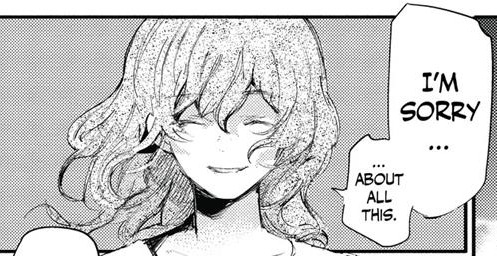
Big long post coming. Couldn’t help myself.
Admittedly, I’m mostly stealing from this post from the old ages (it’s crazy good and turned Eto into my favorite character), so you can read that and honestly get the same information. But I figured I’d take a swing at the behemoth myself.
Also wanna preface the analysis with the fact that I’m using the official translations as my source, as I can’t access the original scans and also couldn’t read them even if I did (cursed by monolingual tendencies).
Under the cut!
Eto is, unfortunately, a character that is built mainly on subtext crammed into very few chapters. Figuring her out is very difficult and a lot of her more nuanced traits can go over most people’s heads (it’s easy to call her insane, for example, and while she does have a few issues up in the old cranium, i’d hardly call her that).
The most important thing about Eto to keep in mind when discussing her is that she has been failed, and as a result of that, she also believes that she has failed those around her.
Her father left her in what is basically a literal shithole, especially for a baby. Her mother, though she died without really knowing Eto, did leave a journal behind, and Eto’s singular insight to the work regarding herself is that she is just a “byproduct,” and her foster parent got killed (presumably) protecting her from V, punting her to an orphanage where she’d have to steal money to survive (see: re 62), and presumably pretty often at that.
She got insanely lucky with the writer gig and shiono, who-- side note-- means a lot to her. Finally, a positive adult figure in her life! Unfortunately, he is a) only human, and b) her editor/coworker, so his positive influence, while welcome, is limited. still, she picks up his cute little hand gestures and I, personally, appreciate that (see: re 62 and compare it to TG 114).

Just the greatest.
Where was I... Ah, Eto being failed by those around her. And where does that leave her? Look no further than TG 98:

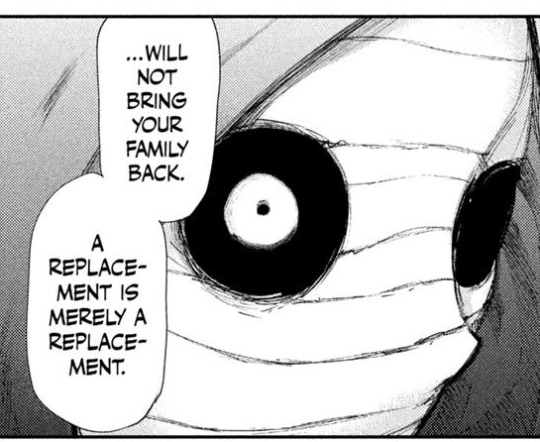
“A replacement is merely a replacement.” Eto doesn’t believe in found family, because she never actually found one.
And within the context of this chapter, we learn another thing about Eto. Whenever she interacts with someone and “breaks” them (the Yasuhisas, Kanae), she heavily projects onto them (because she recognizes their situation; notice how she only ever targets people who are both relatable to her and weaker than her) and breaks apart the “lie” the target tells themself, even if it isn’t entirely accurate:
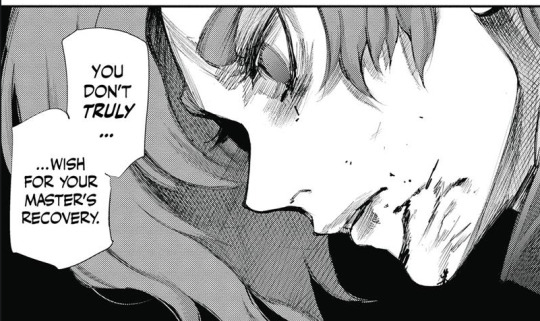
(re 43) This is a false statement; Kanae does wish for Shuu to recover, he’s just upset it’s happening like this. Because who wouldn’t be, in his situation? Despite everything that he and the others did for Shuu, the only thing able to bring him out of his depression is the very thing that caused it. But I digress.
Back on track, there’s also Haise’s analysis of her work, the most personal thing she has, to consider when discussing her in re 39:
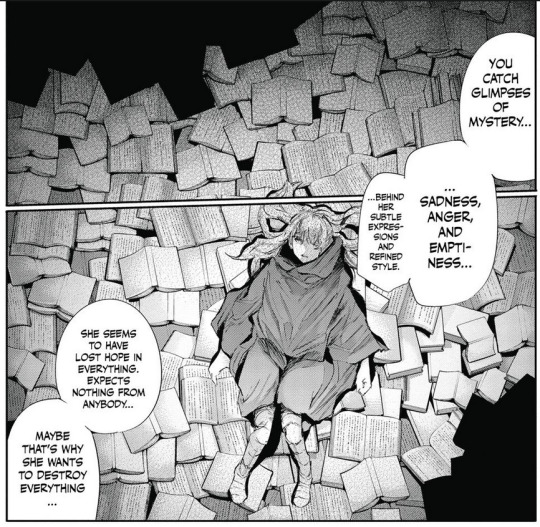
Once again, the void rears its ugly head.
Hopelessness. Emptiness. Filling it with anger and bitterness, and it’s never enough, but it’s all she has. Because the void can only be filled by the things she can never have.
So she throws herself at the CCG, banging her head against its walls with small raids alongside some fellow ghouls and then taking on the special investigators by herself. She’s 14, she’s a kakuja, and she’s mad. Mad at the world that failed her, mad at V for making it the way it is, and mad that things haven’t changed for a very long time. She has Ukina’s journal; she knows how stale the “narrative” is.
Of course, her raids don’t work very well, but she’s basically just a kid. She is as old as Hinami during TG.
Then, she’s finally thrown a bone, and is worse off for it:

Something I’ve noticed when factoring Arima’s influence into Eto’s character is that there is an assumption that the power dynamic between them is equal. It isn’t. I cannot stress this enough; there is a hierarchy at play here, and Eto isn’t the one on top. How do we know this?

(TG 139)

(re 52)
Kaneki was the new toy to replace Eto, the old one.
The ultimate plan is “the One-Eyed King will destroy the egg of V’s world and make something new.” By the time Kaneki does take the throne, this plan has been going on for 13 years. Kaneki was chosen as a candidate at the ten-year mark; he had to have been a non-factor before then. So who is left to become the king instead?
Eto.
The age difference between her and Arima is roughly 4-5 years. Remind you of another relationship?
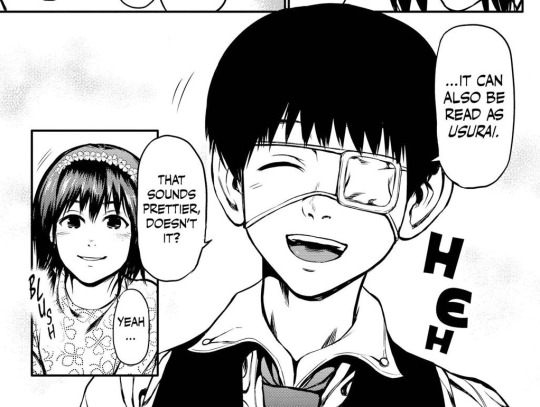
(TG 14)
Uh-oh.
To reiterate, Eto is a 14-year old kid who has been abandoned by everyone who could possibly love her the way she wants. She desires parental love, protective love, the kind of love that makes her feel safe, when she has only ever fought to defend herself.
Enter someone who is far stronger than she could ever be, someone who could actually offer her the protection she so desperately wants. Unfortunately, Kishou Arima is the endgame mindset of Black Reaper Kaneki, to put it simply: someone who is impossibly distant, wants to die, and craves the approval of everyone.
Let’s expand on Arima for a brief moment. “Craves the approval of everyone,” specifically. He is both the One-Eyed King and the greatest ghoul investigator that ever lived. He doesn’t pick one or the other, and when he dies, he doesn’t have to pick. He is mourned by the CCG, and Kaneki, ever a puppet in someone else’s game, carries on his legacy and “wish“ for coexistence.
Eto is no exception to his godly levels of charisma. She is one of Hinami’s foils, and we know how quickly and easily she latched onto Kaneki. It’s safe to assume that something similar happened with Eto and Arima.
And Eto failed him. She doesn’t become king; someone else does. Someone very similar. And yet, when faced with this new person:

(re 56)
Well, then.
Eto also does everything in her power to give Kaneki the information he needs to break the eggshell. She freely gives away information about V, the Washuu’s involvement with them, the connection to the CCG, everything. Or as much as she can give him while under Cochlea’s surveillance.
So what’s the game here? Why does she support Kaneki, the one who basically stole Arima's approval, something everyone around him wants, from under her nose? Better yet, why is she aiding the search for her “replacement” in the first place? Because remember, even before Kaneki registered on her radar for a candidate for the OEK, she and Aogiri were searching for Kanou, the one-eyed ghoul maker specialist man. Aogiri wanted to use Kanou to make as many possible candidates beyond just Kaneki. So even without Kaneki in the picture, Eto wants a replacement. She wants this. Why?
Well, here’s what I think she actually wants:

(re 53)
There’s no other explanation that I can think of for why she would willingly get herself arrested and leave Aogiri to be fully exterminated on Rushima (the One-Eyed Owl totally could have turned the tables of that battle). She’s only lived as long as she has because she doesn’t want to leave anything unsaid. This is also the reason why she reveals herself as a ghoul as Takatsuki; she’s effectively destroying her own career while simultaneously giving V a huge middle finger.
This desire to close off everything she’s built up until now and pass the torch to Kaneki is also represented in her haircut; she’s literally shedding her burdens to give to someone else. Someone similar to her, but kinder than her. Better than her.

(re 52)
--
I’ve said what I’ve come to say. Thanks for reading!
114 notes
·
View notes
Text
20 questions for fic writers
tagged by @petrifiedforests
How many works do you have on ao3?
77... damn
What’s your total ao3 word count?
238,425 not bad all things considered. averages out to about 5k/fic
What fandoms do you write for?
Oh geez. A lot. Um. A lot of Sisters Grimm, a fair amount of Witcher Netflix, a LOT of unpublished stuff for Jeeves and Wooster, Psych, MASH, and a lot more that I like. dabble in?
What are your top 5 fics by kudos?
Unsurpsringly, they're all Witcher fics, since it's the biggest fandom I've written for
place you hand in mine, how long can this last--geralt is cursed to be really touchy-feely at jaskier.
the saint of never getting it right--geralt and jaskier are in a relationship. sort of. they have to talk about pda. it goes. uh. well. it goes.
a garden as fragile as glass--my first witcher fic and probably the only one without a tad title, it's a beauty and the beast retelling
you don't have to say it darling, but i wouldn't mind if you did--oh look this one doesn't have a tad title either! morons to lovers--geralt thinks they're in a relationship but jaskier has no idea
however wide and deep and far my dear--selkie!jaskier au
5. Do you respond to comments? Why or why not?
yes! not always very quickly but I try my hardest to at least send a thank you or some heart emojis. i want to make friends I'm just so bad at being timely and also am the most awkward man in the world i am so sorry
What is a fic you wrote with the angstiest ending
Uh, posted on AO3 is probably The Saint of Never Getting it Right. I wrote it in a fit of post-s2 grumpiness. On ff.net there's almost definitely a bunch of major character death stuff that I wrote as an angsty teeennnn oh WAIT NO THE ANGSTIEST FIC I EVER WROTE WAS A FANFIC FOR PEANUTS WHERE SNOOPY FUCKING DIED. PEANUTS THE COMIC STRIP. (in my defense it was a vent fic i wrote when we put my cat down)
Do you get hate on fics?
Not usually these days but I did get some homophobic comments on some femslash I crossposted on ff.net. i don't go there anymore.
Do you write smut? If so, what kind?
I have... tried. I'm not very good at it.
Do you write crossovers?
No, and I probably won't. I don't quite get the appeal, tbh? I like universe-swap AUs, but I don't really want to play with characters from different universes together.
Have you ever had a fic stolen?
Yeah, actually! Back in ye olde days some people put one of my fics up on Wattpad! I made an account there purely to get them taken down. It happened TWICE.
Have you ever had a fic translated? no! I'd love it if that ever happened, but I don't think I'm quite big enough.
Have you ever co-written a fic before? Not one that's ever been finished, though yes-and headcanoning in chats is my favorite game ever
What’s your all-time favorite ship?
Ah geez. I mean Puckabrina is the cradle that raised me but Geraskier is so dang good, and Redbrina is so much softer than anything else.... Dunno, man. It changes.
What’s a wip you want to finish, but doubt you ever will?
My Geraskier roommates AU is a lot of fun, but it's. Huge. I don't know if it'll ever be done.
What are your writing strengths?
Oh I LOVE to write a panic attack thought spiral <3333 it's so good to write a run-on sentence that just keeps going and hurting you
What are your writing weaknesses?
Finishing.... Sitting down and plugging it all in. I miss the days when I could bang out a chapter of a longfic a week.
Thoughts on writing dialogue in another language for a fic?
I probably wouldn't, because I am a big ol' monolingual and I don't want to throw in a ton of stuff in a language I'm not fluent in. What if someone who does speak the language finds it and sees my high school spanish?
First fandom you wrote for?
The Sisters Grimm! Book series for twelve-year-olds that has remained important to me well into adulthood despite being... uh... of dubious quality. They're still very funny!
Favorite fic you’ve written?
hrm. there's a bit of a recency bias here but i'm very proud of how well i nailed the voices on Friends with (Tax) Benefits
no pressure tagging @witcher-and-his-bard @skeletons-mama @a-kind-of-merry-war
Blank copy/pasta version under the cut
How many works do you have on ao3?
How many works do you have on ao3?
What’s your total ao3 word count?
What fandoms do you write for?
What are your top 5 fics by kudos?
Do you respond to comments? Why or why not?
What is a fic you wrote with the angstiest ending
What’s the fic you wrote with the happiest ending?
Do you get hate on fics?
Do you write smut? If so, what kind?
Do you write crossovers?
Have you ever had a fic stolen?
Have you ever had a fic translated?
Have you ever co-written a fic before?
What’s your all-time favorite ship?
What’s a wip you want to finish, but doubt you ever will?
What are your writing strengths?
What are your writing weaknesses?
Thoughts on writing dialogue in another language for a fic?
First fandom you wrote for?
Favorite fic you’ve written?
3 notes
·
View notes
Note
That depends on my dreams. Regardless if my dreams are so bizarre, sensical or nonsensical.. I always overly analyze my dreams whenever I wake up. And, if I am able to, I'd try remembering what I can actually remember from my dreams. Sometimes I would forget about aspects of my dreams, especially the most interesting aspects in my opinion.
But for any dreams that I can remember, I would write down notes, I'll probably use any ideas that seem plausible enough as a plot that may be interesting to watch or read that happen. But I'd still need to write.
~
Yes. Instead of episodes that are barely half an hour long, make those episodes at least an hour. Maybe longer. Everything we'd actually just said should happen.. More backstory for certain characters (including Kuryu and Warrior characters). Either a war between the SWORD and Kuryu gangs. Possibly an ally or enemy relationship with new Kuryu if that ends up happening. Revealing who or want Mr. Bulge is to them.
I might make this into a sequel. Or maybe just a long story if I actually write the damn story. Because I've had these same thoughts before.
I do think a lot of characters, from different gangs, would actually just get along if given the chance to be around those people. Which is not really an often occurrence though.. But Noboru is really used to being around people like intelligent than me, so I'm imaging how he may be reacting to meeting Seki. Seki's the least intelligent of those three.
Exactly! Sakyo and Ukyo just seem like they don't care what happens either way. So they mostly mind their own business. Kato could really keep secrets if he wants to. But, if Hyuga said or do anything that just annoys him, he would tell his secrets out of spite though. But it would be obvious that the younger Daruma accidentally mention their entire secrets frequently, more than they actually reveal too. In my opinion.
~
That depends on the sites you'd use. Some sites would have frequent popups whenever you'd click on the screen and other sites might end up waiting until the next episode. Every site is very different that way.
I might not mind watching a foreign show or movie without subtitles.. But only if I've watched it more than once because then I would know what was already happening in the plot. But if it's a show or movie I'm watching for the first time, I might want subtitles because I would like to know what is actually happening in the plot. I know that I'm not the fastest reader. But I would still like to know what's happening though.
~
I love Joong-ki's Italian accent! And if I'm actually being honest about this.. I've never had an interest in the Italian language until now. And I do blame Vincenzo for this. I know his accent is 100% - depending on the comments you'd read from Italian fans. But his accent does really have an authentic sound to that way he speaks (in my opinion). Like it is kind of funny. My grandfather's Italian. Yet a fictional character was the one that makes me want to learn more about the language. And I don't know if I would make an attempt to learn other languages.. So if I ever did learn other languages, Italian may be one of the languages.
Don't judge me.
I know Vincenzo appreciates Jang's English! Because he's actually an only character (in Korea) would can actually pronounce his name, but that can't be helped in you aren't fluent in English or Italian languages though. And I know Chayeong frequently complains whenever Jang's alternating between English and Korean when he speaks to her. She's hating his habit, but she's also kind of used to it at the same time too.
Which is why I love some of my original characters being multilingual.
Wrong! Despite Mandy being born and raised in America - before his family moved to Japan, Japanese is his native language. Which is just so weird to me since he's a mixed person... "Even though he was born outside of Japan, he was raised monolingual in Japanese and only started to study English later on in his career." Actually, there are also some videos of Takahiro teaching him to speak English too. So that is another person I know who can speak English from the Exile Tribes.
Alan's multilingual. He's mixed too. He's half Filipino. So he can speak Japanese, Tagalog and English. Never really heard his English accent.
I don't really know about in real life... But I've heard Elly speak English in H&L and in his music videos. So maybe he can speak English?
Kana Oya's half Brazilian. Her English seemed fluent in the High&Low franchise. So she might possibly be able to speak other languages.
I've also read somewhere that Naoto does speak English but I haven't actually heard him speak English.. That I actually know of anyway.
Actually.. I am sending you a link about some comments about which guys in Exile can speak English. Some are people we've already said.
Exactly! Rocky mentioned that Kizzy and Kaito lived in America when Kizzy went to get her operation. Let's say a minimum of two years. So I don't know if they actually lived there, or went there frequently when she had to get her operations. And obviously she is the more talkative one between Kizzy and Kaito.. So I can imagine her speaking English, even if her language skills are only conversational English. Now I'm so imaging her teaching Kaito, Rocky and whoever else who wants to be learning the language. Actually! Now I am imaging original characters (who are multilingual) teach Kizzy English before going to America.
Maybe Rocky wants to learn English if he meets foreign women. But.. Joking aside. Have you seen the people in the background in the club though? Not all of them are Asian. Maybe there are times when some foreigners go to Club Heaven whenever people go to Japan then? It is an idea that I've thought about before. And I'm sticking with that too.
~
The drinks served at Club Heaven are milky, resembling the “milk-plus” that Alex and his droogs drink at Korova Milk Bar.
The aforementioned Club Heaven posters even say “Milk Plus” right on them.
I sent you a picture of the signature drinks from Club Heaven. Which.. I have to say is funny because trying to find pictures of the drinks, I've noticed that there's an actual club called Club Heaven. Just copycats.
They should have actually made real recipes for the signature drinks - just so the older audience viewers of H&L wanted to try that drink but that could only me though. I'm so curious. I want to drink that drink if it has ingredients that I might actually want to try. I wanna try recipes though. Like how restaurants would have special menus, for food and drinks, when popular medias comes out (like they do with animanga).
there would definitely need to be longer episodes or more than just 10 episodes. i’d like to see the gangs fight again, since cobra and jesse didn’t actually get to finish their fight. and they could pit hiroto and ice against each other again. i think the rude boys would want to fight ryu since he injured smokey.
that’s why they need to make another season! since with the alliance, they can have cross-gang interactions with characters without having them fight because they’re allies now. i’d like to see rocky and noboru interact. and kizzy and cobra. i want more of smg and the daruma babies hanging out too.
~
i can’t watch anything without subtitles. i need to know what’s going on. i watch shows in english with subtitles on. i need the words! otherwise i just miss stuff.
~
i don’t know if i’d learn italian, but i haven always wanted to learn another language. i just don’t have the time or patience. i was in a japanese class for a few years in primary and high school, but it’s been years since then.
since koo had never met kizzy and kaito and he’d been with rocky for a while, i’m guessing they lived over in america for a little while. i think kizzy’s more fluent and kaito’s more basic conversational, he can understand it and speak it a little, but he’s preferable to japanese and counts on kizzy to get his point across or explain things to him.
i think there were non-asian people in club heaven and the warrior’s club (funk jungle?). i dont think rocky would mind tourists in his club so long as they’re respectful because he’ll still kick their asses if they’re rude or creepy to women.
~
i don’t know why i imagined the drinks in flute glasses. they did serve them in flutes at one point right?
there’s a lot of milk cocktails around, but i can figure out what looks right like in that picture. i could be some form of white russian, but the club heaven drink looks clearer, hence why i thought something with sake.
h&l, release some notes! what is that supposed to be?!
0 notes
Note
Re: The "Fandom teaches people to analyse media a specific way" Thread, fucking thank you!! I've come across that thread multiple times now, and every time I see it, always with all these brand new, nuanced additions to boot, I can never get through it without being majorly frustrated despite how fascinating the topic actually is, because nobody points out the elephant in the room of, hey, actually, fandom is very huge and very diverse, to the point that the phrase "fandom culture" is highly inaccurate. There are fandom *cultures*. Multiple cultures, not just for every fandom, but also, if the fandom in question is big enough, multiple cultures in a *single* fandom. This goes double for practically any and all international works.
I mean, come on, as a single example, the Japanese Pokémon fandom and the USAmerican Pokémon fandom are absolutely *not* the same, and in many ways aren't comparable. I speak from personal experience. But also, the USAmerican Pokémon fanartist community and the USAmerican Pokémon fanfic writer community are very different as well. Again, from personal experience. And while the Japanese and USAmerican Poké fandoms, and the USAmerican Poké artist and fanficcer communities can and regularly do intersect, they are still their own different sects of the same fandom(s), not to mention all the sub-communities within them all as well. *And* I am only referencing online communities, specifically, here. (Not even going to get into the cluster-fuck that is the Pokémon Anime Fandom vs the *Other* Pokémon Anime Fandom vs the Pokémon Main Games Fandom vs the Pokémon Side Games *Fandoms* vs the Pokéspe Fandom vs the *Other* Pokémon Manga Fandom lol)
What you wrote about this point-of-view coming from encounters with a select few mostly young, mostly monolingual native English speaking USAmericans in (some) online transformative fandoms, and then this being pushed onto the entirety of fandom, as an international phenomenon, hit really close to home. Like, I don't know, as a young non-native English speaking non-USAmerican who is in both transformative and archival fandoms, and who first got into fandom not online but offline, together with a close friend who is currently studying English Language and Literature on a university level, no actually, I don't think this flat, monolithic idea of fandom "taught" me this specific type of analysis and *only* this type of analysis. Personally, I already knew this type of analysis and many others way before I joined fandom spaces, and then when I did I was and am able to use my prior knowledge to develop transformative works, and to also socialise with other fandomgoers, including ones more knowledgeable than me such as my friend, through meta. Your Experiences Are Not Universal, and all that.
Anyways, as you can probably tell from the username, I (mostly) use this account to lurk, so I'd never go and write all of this down in the actual thread. So, again, thank you for expressing my own grievances with your addition.
Yeah, I'm glad I could help!
Your comment on pokeani actually reminds me of a more... robust culture gap.
One that happened when fans of Korean and American cinema tried to analyze the other school of film.
A gap that has unfortunately persisted academically for decades, in spite of the efforts of pretty much anyone familiar with both.
Oh yeah, and in spite of S Korea's government spending the largest percent of their GDP of any country on earth, for decades, doing cultural outreach that is broadly recognized as the most advanced in the world.
A gap which was, unironically, closed in the last years by everyone's "most hated" fandom. The very essence of ~self-obsessed fandoms that go too far.~
Teenage American K-pop fans.
Because the willingness to enjoy Korean cinema on its own terms by that group created a body of tools and vocabulary for explaining it to other Americans that had never and could never exist without them.
How? Why??
Two factors.
First, Korean cinema is relatively younger than American and thus is intimately influenced by it, leading to the use of similar body direction, set design, and camera language.
And second, Korean literary traditions are far older and culturally completely different.
This led, inevitably, to the same circle of American and Korean publics seeing very technically adept films with writing that was unavoidably alienating and directing that seemed to completely disagree with the rest of the film.
For YEARS we were stuck with Americans calling Korean film beautiful, evocative, and boring. Koreans calling American film visually stunning, fast paced... and boring. Imports of S Korean film and TV to the US, when they existed at all, tended to have weak receptions by US audiences.
Enter: K-pop girlies.
Their motives ranged from "learn the language" to "watch the hotties" and all manner of other things.
But their actual ACTIONS were to ravenously consume Korean film and TV across every genre and era.
And then to talk about it. Constantly. To play with the cinematic language until they were so fluent they created a new genre of micro film. To make friendships with S Korean music and film fans, artists, and writers and learn from them.
To network and rework with a scale and passion never before seen from US citizens over Korean art.
Until they developed a whole suite of easily understood English vocabulary for studying Korean art and literary history that did not exist in English before then.
Let me be clear: all the shitty things you've heard about US kpop fans are true and probably even worse IRL.
But, even so?
K-pop fans created an entire system of film translation and localization between the US and Korea that not only didn't exist, but that academics, studios, and entire governments had been trying to make for decades.
Once the framework was there, American film studios, writers, etc had the tools and data to actually determine which Korean films would be INTERESTING to American audiences. Which ones would land correctly. How to translate important lines or scenes into film language US audience's understand.
And now, US cinema is a foreign film renaissance. I mean holy shit, Americans are going to see subtitled Korean films in theaters.
But, of course, the fact that an only somewhat related fandom managed to thrust international film criticism and as a result international cinematic cooperation forward by DECADES?
Doesn't matter. Not when one American woman so proud of her ignorance calls fandom a closed audience of calvinists.
And that was done by the exact type of young, American fan she was actively mocking as ~incapable of critical interpretation due to closed minds and ignorance.~
The irony abounds.
37 notes
·
View notes
Note
Which countries would you map to seven kingdoms of Westeros?

My primary area of medieval knowledge is France and England, and Spain to a lesser extent. Fortunately, GRRM admits that as a monolingual English speaker, most of his medieval knowledge comes from English sources (though he admitted to having figurines of Peter the Cruel and Henry Trastamara, which interested me because of the parallels between Daeron II and Daemon Blackfyre). Furthermore, GRRM uses parallels from other countries/cultures (Ned’s daughters get Sanskrit names while his name is pseudo-German, the Parisian Oldtown has the Lighthouse of Alexandria aka Hightower in it) often with no regard to where they came from or how they fit, much like the worldbuilding of his fantasy hero, Robert Howard. Many of the world building elements are more stereotypes or taken from pop culture than reflective of real world history (looking at the Dothraki and the Mongols. GRRM used the Pax Mongolica quote…to describe the north under the Starks). Furthermore, GRRM admits that he also uses “a hint” (or a lot) of his imagination in some worldbuilding, so he wasn’t directly inspired by real life (you could say the same for places inspired by fictional works such as Lovecraft’s or Moorcock’s, such as the island of Leng and the Patrimony of Hyrkoon). All I can do is guess the inspirations and draw parallels if he hasn’t said anything.
The North: a really big Northern England/Southern Scotland, maybe some Icelandic, due to the Wall being inspired by a trip to Hadrian’s wall
The Riverlands: maybe Brittany, a frequently fought over and invaded part of modern North France
The Iron Islands: I wrote a meta on how they are very stereotypical Vikings with some hints of depth; there’s also some Scottish Isles influence
The Vale: maybe Wales, due to the sheep herding and mountains?
The Westerlands: southern/Middle England, considering how the Reyne-Tarbeck rebellion is modeled after the Montfort rebellion
The Reach: Central/Southern France with its emphasis on chivalry, except with Paris included
The Stormlands: Northern Spain, for its frequent clashes with the Reach and Dorne, its stony shores and excellent sailors
Dorne: Southern Spain, due to the conquest and rule of the Umayyad Caliphate, the silk veils, the Tabernas desert, the variety of phenotypes. GRRM has mentioned other countries as influence
Keep in mind that I’m limited by knowledge of other regions, as well as by space (I’m sure if I had enough time, I could go over some of the other details GRRM took from history)
A note about Essos under the cut:
The places of Essos are easier to identify as one culture/region because he doesn’t spend as much time building them (that most of them include what Americans would consider people of color makes his thin sketching that much worse); significant to my interest in ASOIAF is the Kingdom of the Three Daughters; despite some Greek names (and that lazy “gonfaloniere” Fire and Blood included in Lys, which is just an untranslated title for a communal office in Florence), Tyrosh is obviously based on Tyre, Lebanon, which was famed for its dye; Myr is based on Sidon, the oldest of the Phoenician city-states and famed for glass making; and Lys, despite the Rogares being uninspired Diet Medicis, is Cyprus, the Island of Love (it was the legendary birthplace of Aphrodite), a fertile island, that had the most Greek influence of the three due to its proximity. All three were governed by judges aka magisters called shofret, Sidon and Tyre were United for a time, they lived off of trade, and though there were old families the common people also had a voice in government. Further east the cultural comparisons get more obvious, with Magical!Crete as Qarth, Scythians as Sarnori, China as Yi Ti…GRRM’s worldbuilding is not his strong point, but as long as he wasn’t focusing on it (instead of letting it eat up too much of his writing), I could deal and just focus on his interesting characters.
44 notes
·
View notes
Text
Despite the convention of most characters having British accents in fantasy shows and movies, today I’m thinking about how several of the crows in the books don’t speak Kerch as a first language and therefore probably have in-universe cool accents
Like, Kaz and Wylan are Kerch, but Nina would have a Ravkan accent (probably faint because she’s supposed to be good at languages) Inej might have a Suli one, and Matthias canonically is not very good at Kerch and has a really thick accent based on how he learned the language
And even with the characters who do speak it as a first language, do Kaz and Wylan have different accents based on their upbringings? Did Kaz have a country accent when he came to Ketterdam, and is that something that he had to get rid of to become Kaz Brekker? Jesper probably speaks both Kaelish and Zemeni as first languages, but he’s apparently good enough at Kerch to move to Ketterdam alone at fifteen and be fine, so when did he learn it and what does he sound like when he speaks it? ( I also have a lot of questions about the dominant language in Novyi Zem but that’s not the point here). Inej probably speaks Ravkan, based on where the Suli live, but how good at it is she? Also, how does Kaz feel about being the only monolingual crow and does it make him mad (yes) and at what point does he get the rest of them to teach him their languages?
Idk I love languages and theorizing about what each of the characters would speak and sound like is fun
#six of crows#shadow and bone#kaz brekker#inej ghafa#wylan van eck#jesper fahey#Matthias Helvar#nina zenik#long post#unhinged rambling#theory time!
100 notes
·
View notes
Text
2022 Movie Odyssey Award for Best Original Song (preliminary round)
Because tumblr still cannot show indented bullets on the dashboard, this is best viewed on my blog via the direct link.
Informal invites go out to @asexual-idiot-ramblings, @biglifehightides, @birdsongvelvet, @blumes, @cinemaocd, @dog-of-ulthar, @exlibrisneh, @ideallaedi, @kataka-taka, @life-traveller, @mehetibel, @memetoilet, @mundi41, @myluckyerror, @shadesofhappy, @sunsetpanic, @phendranaedge/@twosontooter as longtime followers or folks who have participated in previous editions in MOABOS but have been on the inactive side lately. You are all invited to participate in either the prelim and/or just the final round. If you wish to participate in the prelim, please contact me so I can get you sorted into a group ASAP.
INTRODUCTION If you are being tagged on this post, that is because you graciously accepted the invitation to help out with this year's edition of the Movie Odyssey Award for Best Original Song (MOABOS) or were perhaps active in the past. This is the milestone tenth edition of MOABOS (MOABOS X?) and the ninth time with outside help from family, friends, and followers on tumblr. In other words, it's also the tenth year for my classic movie blog that is responsible for this end-of-year tradition! Thank you all for agreeing to participate in this admittedly peculiar tradition that continues to endure despite a pandemic and personal difficulties.
For newcomers (and oh boy there are many of you this year): my classic movie blog traditionally ends the year by honoring some of the best achievements from movies that I saw for the first time this calendar year (the "Movie Odyssey") with an Oscar-like ceremony. It is, for the most part, no democratic process. I choose all the nominees and winners from each category, save one: Best Original Song. It is the only category that does not require you to watch several movies in their entirety. MOABOS is also a sort of cinematic-musical thank-you for your moral support and a way to make the idea of watching older movies more accessible for those who might not seek them out.
SET-UP
An unspecified number of songs have already advanced to the final round. 22 songs will contest this preliminary round in two groups - Group A and Group B. With the pandemic still taking a toll on contemporary filmmaking, many of you will notice right away there are no 2022 entries for this year's MOABOS. And for another year running, very few of this year's entries are from the twenty-first century (although one particular movie from this century has quite a few entries this year). Danny Kaye - who was in last year's winner "Lullaby in Ragtime" from The Five Pennies (1959) - does not return to defend MOABOS this year. But we'll see Kaye again another year. There is no perennial Elvis contender this year either - cue the celebrations from the many Elvis ambivalents among you.
One year after the most multilingual field MOABOS had ever seen, we take a sharp turn. Reflecting how difficult this year has been for me (and I've needed more comfort movies this year), there are zero entries this year from a language other than English. This is a monolingual field, down from last year's record of eight languages represented. No anime films I saw this year had compelling contenders for MOABOS, nor did anything that I saw for Viet Film Fest (VFF). And I didn't see a lick of classic Bollywood this year again (this needs to be rectified).
2019's MOABOS preliminary remains the gold standard for sheer chaos. The miraculous comeback of "I Dug a Ditch" from Thousands Cheer (1943) in the prelim's final hour brought a song that seemed dead as a doorknob back to life. A song about digging a hole got out of its hole, if you will. No group since has ever matched that drama. Might this be a nailbiter of a result?
INSTRUCTIONS Please rank (#1-11) at least seven of your group's songs. Please consider to the best of your ability (these are only suggestions, not strict guidelines):
How musically interesting the song is (incl. and not limited to musical phrasing and orchestration);
Its lyrics;
Context within the film (contextual blurbs provided for every entry for those who haven't seen the films);
Choreography/dance direction (if applicable);
The song's cultural impact and context/sociopolitical context/life outside the film (if applicable, and, in my opinion, least important factor)
Because of the difficulty to find clean recordings of much of this music, imperfections in audio and video quality may not be used against any song.You are encouraged to send in comments and reactions with your rankings - it makes the process more enjoyable for you and myself! The top six songs in each group automatically advance to the final round. Unlike previous years, no songs finishing outside the top six will be considered as an at-large finalist. The deadline for submission is Friday, December 16 at 11 PM Pacific Time. That is 9 PM Hawaii/Aleutian Time. That deadline is also Saturday, December 17 at 1 AM Central Time / 2 AM Eastern Time / 7 AM GMT / 8 AM CET / 9 AM EET. This deadline - as we have seen in the last few years - will be pushed back if there are a large number of people who have not submitted in time. However, I very much do not wish to extend the deadline because the final round is more intensive and usually involves more participants. A small group of longtime MOABOS veterans have been asked to do both groups, if possible (but they are required to complete their assigned group first before moving on). Tabulation details are under the “read more” cutoff.
Please participate in the group you have been sorted into, if you have not yet been sorted into a group and would like to participate, please contact me. You can access most, not all, of your group’s songs in these YouTube playlists: (Group A) / (Group B). Again, please note that not all of your group’s songs may not be in the playlist for various reasons.
GROUP A (playlist)
“Good Morning”, music by Nacio Herb Brown, lyrics by Arthur Freed, Babes in Arms (1939)
Performed by Judy Garland and Mickey Rooney
Early in the first Judy Garland-Mickey Rooney musical of several (the two had previously appeared together in the fourth film of the Andy Hardy series) for Metro-Goldwyn-Mayer (MGM), two vaudeville kids from different families – "Mickey" Moran (Rooney) and Patsy Barton (Garland) – are attempting to sell one of his songs to a musical publishing company. Babes in Arms was released a month after Garland starred in The Wizard of Oz.
If this song sounds familiar, it's because its most famous use was when it was recycled for Gene Kelly, Debbie Reynolds, and Donald O'Connor during Singin' in the Rain (1952) – a movie that recycled many MGM songs to immaculate results (MGM liked to recycle its songs multiple times for some of its musicals).
“Island in the Sun”, music and lyrics by Harry Belafonte and Irving Burgie, Island in the Sun (1957)
Performed by Harry Belafonte
Played over the opening credits of this romantic drama, complete with aerial footage of the island where the film takes place. Set on a fictional Caribbean island (and shot on location in Barbados and Grenada), Island in the Sun was controversial when it was first released due to its depiction of interracial relationships, adultery, and colonial politics.
Jamaican-American singer and actor Harry Belafonte introduced calypso music to American audiences in the 1950s. The genre, originating in Trinidad and Tobago in the 18th century, is influenced by the storytelling tradition of West African griots and often employs a syncopated 2/4 beat derived from West African musical beats. Calypso is a precursor to ska and reggae.
“The Lady in the Tutti Frutti Hat”, music by Harry Warren, lyrics by Leo Robin, The Gang's All Here (1943)
Performed by Carmen Miranda and chorus
This is Carmen Miranda's signature song. It appears midway in the first half of this musical as part of a dinner show onboard a ship bound for a destination the movie never makes clear. The choreography was by director Busby Berkeley, best known for his mass choreographed song-and-dance numbers that he popularized in the 1930s (but had become out-of-fashion by the '40s).
This song – tame by today's standards – was considered risqué when it was released (see: the lyrics and all of that... citrus). The Gang's All Here was made during a time when the major studios were making certain movies adhering to the U.S. State Department's Good Neighbor Policy, as the studios attempted to show Latin American culture and persons in a positive light to counteract any sympathies with the Axis. Miranda, more popular in the U.S. than in her native Brazil during the height of her career at 20th Century Fox (RIP "Fox"), was typecast in "exotic Latin" roles during this time. Only closer to the end of her career and after her death, was she more venerated by her fellow Brazilians, as a South American who "conquered" American culture for a time.
“Never Look Back”, music and lyrics by Chilton Price, Love Me or Leave Me (1955)
Performed by Doris Day
Ruth Etting (Day) has left the rough-and-tumble Chicago nightclub scene, thanks to her gangster (and now ex-) boyfriend Martin Snyder (James Cagney). At this point, Ruth has made it in the recording industry and is now recording a song for a Hollywood movie she just starred in. A jealous Martin watches on in the recording booth.
“No Love, No Nothin'”, music by Harry Warren, lyrics by Leo Robin, The Gang's All Here (1943)
Performed by Alice Faye
A dinner-and-a-show club is in dress rehearsal for their newest show and, more urgently, a war bond party. Eadie Allen (Alice Faye) is the performer here, with U.S. Army servicemember Andy Mason Jr. (James Ellison; whose character is on a furlough) among the few people permitted to preview the performance. Andy and Eadie had a chance encounter a few years back, with the two clearly interested in each other but nothing transpiring.
In the days of Old Hollywood, key cast and crewmembers were contracted specifically to the major studios. Some of the major studios had their signature musical stars. Among musical actresses? Judy Garland was contracted to Metro-Goldwyn-Mayer (MGM); Doris Day to Warner Bros; Deanna Durbin for Universal; Ginger Rogers for RKO while partnering with Fred Astaire. Until her being blackballed for a perceived breach of contract, it was Alice Faye who was 20th Century Fox's principal musical actress (she was supplanted by close friend Betty Grable). Faye makes her MOABOS debut, and it won't be the last time we see her.
“Once and For Always”, music by Jimmy Van Heusen, lyrics by Johnny Burke, A Connecticut Yankee in King Arthur's Court (1949)
Performed by Bing Crosby and Rhonda Fleming
From a movie based very loosely on Mark Twain's comedic novel of the same name, “Once and For Always” is the signature love song between Hank Martin (Crosby) and Alisande la Carteloise (Fleming). In this film, American mechanic one day wakes up in King Arthur's (Cedric Hardwicke) land of Camelot. And while gracing Camelot with jazz, mid-century machinery knowhow, and "magic" to piss off Merlin (Murvyn Vye) and Morgan le Fay (Virginia Field), he falls for Arthur's niece, Alisande.
“Once Upon a Time in New York City”, music by Barry Mann, lyrics by Howard Ashman, Oliver & Company (1988)
Performed by Huey Lewis
Played over the opening credits of this movie in the Disney Animation Studios canon. Oliver & Company is an adaptation of Charles Dickens' Oliver Twist to the streets of New York City. Instead of human street urchins, the characters are mostly sassy talking animals.
Oliver & Company was the last Disney animated movie before the beginning of the so-called "Disney Renaissance" with The Little Mermaid (1989). This film was released on the same day as Don Bluth's The Land Before Time, and was soundly beaten at the box office during a brief, intense period of rivalry between Bluth (a former Disney animator) and a struggling Disney.
“Pass Me By”, music by Cy Coleman, lyrics by Carolyn Leigh, Father Goose (1964)
Originally performed by Digby Wolfe; provided version performed by Cy Coleman
Played over the opening credits of this WWII comedy. Cary Grant plays the slovenly and usually inebriated American beachcomber Walter Eckland, who lives on an otherwise deserted Pacific island, and has an agreement with the Allied forces to report any Japanese warplanes or ships that he sees. His routine is interrupted one day when he encounters Frenchwoman Catherine Freneau (Leslie Caron) and seven young schoolgirls she's been tasked to take care of.
“Pillow Talk”, music and lyrics by Buddy Pepper and Inez James, Pillow Talk (1959)
Performed by Doris Day
This is the title song – played over the opening credits – to this romantic comedy starring Doris Day and Rock Hudson.
This was the first of three groundbreaking romcoms (an informal trilogy) starring Day and Hudson. Tony Randall also starred in all three of these movies in supporting roles. Along with Lover Come Back (1961), Send Me No Flowers (1964), Pillow Talk was considered risqué for the time and helped to contribute to the demise of the Hays Code (a series of self-censorship guidelines for almost all major Hollywood movies released from 1934-1968). For the classic film buffs out there, Pillow Talk is like a pre-Code picture that just happened to show up in the late '50s.
“Someone's Waiting for You”, music by Sammy Fain, lyrics by Carol Connors and Ayn Robbins, The Rescuers (1977)
Performed by Shelby Flint
Six-year-old orphan Penny (Michelle Stacy) has been kidnapped by the greedy Madame Medusa (Geraldine Page). Medusa has imprisoned Penny in a bayou in Louisiana. But the resourceful Penny has sent a message in a bottle that has been received by the Rescue Aid Society, an international mouse organization housed in the U.N. in New York. This song plays non-diegetically as our two mice heroes, Bernard and Ms. Bianca (Bob Newhart and Eva Gabor), arrive.
“When You're Next to Me”, music and lyrics by Eugene Levy, A Mighty Wind (2003)
Performed by Mitch & Mickey (Eugene Levy and Catherine O'Hara
(soundtrack/end credits version) / (“public broadcast” DVD extra version)
Heard over the end credits of this mockumentary comedy spoofing American folk musicians. A Mighty Wind is about a folk music reunion that sees three acts reunited for a send-off public TV special. The “public broadcast” version provided here is a DVD extra and was not part of the film.
Group A participants include: @addaellis, @emilylime5, @halfwaythruthedark, @maximiliani, @rawberry101, @rosymeraki-blog, @shootingstarvenator, and @theybecomestories. Sixteen others including myself and my sister will be joining you in this group.
GROUP B (playlist)
“Anyone Can See I Love You”, music and lyrics by Allan Roberts and Lester Lee, Ladies of the Chorus (1948)
Performed by Marilyn Monroe
Early on in this B-picture romantic musical, burlesque showgirl Mae Martin (Adele Jergens) secretly arranges for her daughter, fellow showgirl Peggy (Monroe), to take her place for a special number. It's a hit, and Peggy lands a lead role at the burlesque.
“I’ll Never Stop Loving You”, music by Nicholas Brodszky, lyrics by Sammy Cahn, Love Me or Leave Me (1955)
Performed by Doris Day
(use in film) / (single version)
Nominated for the Academy Award for Best Original Song
Ruth Etting (Day) has left the rough-and-tumble Chicago nightclub scene, thanks to her gangster boyfriend Martin Snyder (James Cagney). Ruth wants to break into the recording industry and, early on that journey, partakes in this early rehearsal with singing coach Johnny Alderman (Cameron Mitchell; whose character falls for Day's).
“A Journey to a Star”, music by Harry Warren, lyrics by Leo Robin, The Gang's All Here (1943)
Performed by Alice Faye; reprised by film's cast
(initial performance) / (reprise)
Onboard a ship bound a destination to, erm, somewhere, onboard entertainer Eadie Allen (Alice Faye) starts falling with Andy Mason (James Ellison), who is shortly about to report for duty in the South Pacific. The reprise occurs as a film-ending fantasia, complete with Busby Berkeley's oftentimes kaleidoscopic mass choreography, which he popularized in the 1930s (although they were already out-of-fashion by the time he made The Gang's All Here).
In the days of Old Hollywood, key cast and crewmembers were contracted specifically to the major studios. Some of the major studios had their signature musical stars. Among musical actresses? Judy Garland was contracted to Metro-Goldwyn-Mayer (MGM); Doris Day to Warner Bros; Deanna Durbin for Universal; Ginger Rogers for RKO while partnering with Fred Astaire. Until her being blackballed for a perceived breach of contract, it was Alice Faye who was 20th Century Fox's principal musical actress (she was supplanted by close friend Betty Grable). Faye makes her MOABOS debut, and it won't be the last time we see her.
“Love Survives”, music and lyrics by Al Kasha, Joel Hirschhorn, Mike Curb, and Michael Lloyd, All Dogs Go to Heaven (1989)
Performed by Irene Cara and Freddie Jackson
“Love Survives” appears as the first song in the end credits of this animated musical fantasy directed by Don Bluth (1986's An American Tail, 1988's The Land Before Time). To preempt your questions about the YouTube comments in the provided link, it should be noted that this song was dedicated to voice actress Judith Barsi – who plays the human protagonist, Anne-Marie, in this movie (and Ducky in the original Land Before Time) – after she and her mother were both murdered by her father before this film was released.
“A Mighty Wind”, music and lyrics by Eugene Levy, Christopher Guest, and Michael McKean, A Mighty Wind (2003)
Performed by The Folksmen (Christopher Guest, Michael McKean, and Harry Shearer); Mitch & Mickey (Eugene Levy and Catherine O'Hara); and The New Main Street Singers (John Michael Higgins, Jane Lynch, Parker Posey, Christopher Moynihan, David Blasucci, Mark Nonisa, Steve Pandis, and Patrick Sauber)
In this mockumentary comedy directed by Christopher Guest, the son (Bob Balaban) of an acclaimed folk music producer tries to put together a memorial concert on public TV to honor his late father, asking the three most famous of his father's acts to participate. After some drama among all three groups, they all come together for the concert, with this number concluding the occasion.
The video provided is from the public television alternative print that was offered as a DVD extra, not how this scene was shot in the movie. I have decided to provide the public TV alternative because the original is not available on YouTube (and also because the public TV version mirrors closely how it was shot in the film). No apologies for that dirty lyric.
“Old Joe's Place”, music and lyrics by Christopher Guest, Harry Shearer, and Michael McKean, A Mighty Wind (2003)
Performed by The Folksmen (Christopher Guest, Michael McKean, and Harry Shearer)
In this mockumentary comedy directed by Christopher Guest, the son (Bob Balaban) of an acclaimed folk music producer tries to put together a memorial concert on public TV to honor his late father, asking the three most famous of his father's acts to participate. In this segment covering the Folksmen, we see some archival footage of one of their performances back at the height of their popularity. Please don't make me explain the punchline in this song.
The sharp-eyed and widely-watched among you will notice that those three men are the same people who comprise the fictional band Spinal Tap from the mockumentary This is Spinal Tap (1984). At the very few concerts that Spinal Tap have given, the Folksmen are usually the opening act.
“Paducah”, music by Harry Warren, lyrics by Leo Robin, The Gang's All Here (1943)
Performed by Benny Goodman and His Orchestra, Carmen Miranda, and Tony DeMarco
Appearing late in The Gang's All Here, “Paducah” – in yet another example of American songwriters taking their song titles from funny-sounding American placenames – is the opening number of the war bond party that wraps up this film's narrative.
See my note for “The Lady in the Tutti Frutti Hat” in Group A.
“Roll Up Sailorman”, music by Eric Ansell, lyrics by Henrik Ege, Big Fella (1937)
Performed by Paul Robeson
(use in film; begins at 21:44, ends at 23:32) / (soundtrack)
In a racially integrated, blue-collar neighborhood in Marseille, dockworker Banjo (Robeson) comes to the local café to enjoy an evening. Earlier in the day, the local police – noting Banjo's good reputation in the hardscrabble community, request him to listen and report back on the local gossip. As he and the café patrons sing together, he is wrestling with his own sense of morals and place among his friends.
“The Sneak Song”, music by Ben Please and Beth Porter, lyrics by Mikey Please, Robin Robin (2021 short)
Performed by Bronte Carmichael, Adeel Akhtar, Amira Macey-Michael, Tom Pegler, Endeavour Clutterbuck, and Megan Harris; reprise also performed by Richard E. Grant
Robin Robin was one of last year's Academy Award nominees for Best Animated Short Film. The film, an Aardman Animations (Wallace and Gromit, Shaun the Sheep, 2000's Chicken Run) production, stars a Robin (Carmichael) raised by a family of mice. Robin joins the family's attempt to sneak into a "Who-Man's" house and take away some food. The provided video includes the initial performance and reprise.
“Tomorrow is the Song I Sing”, music by Jerry Goldsmith, lyrics by Richard Gillis, The Ballad of Cable Hogue (1970)
Performed by Richard Gillis
In this American Western film's opening minutes, Cable Hogue (Jason Robards) has been abandoned in the desert by his two companions. He wanders the Arizonan desert, speaking in a folksy demeanor to no one but God as if trying to bargain over his desperate situation. The opening credits play during this song and Cable's exhortations to the Lord. For film score fans: this movie was released one month after Patton (which Jerry Goldsmith also scored).
“Why Should I Worry?”, music and lyrics by Dan Hartman and Charlie Midnight, Oliver & Company (1988)
Performed by Billy Joel
(use in film) / (soundtrack version)
Early in this adaptation of Charles Dickens' Oliver Twist (but where almost all the characters are sassy talking animals), the dog version of Billy Joel, Dodger, reneges on a deal with young orphan cat Oliver (Joey Lawrence) to steal hot dogs from a human vendor.
Group B participants include: @idontknowmuchaboutmovies, @introspectivemeltdown, @plus-low-overthrow, @umgeschrieben, @underblackwings, @yellanimal, Sixteen others including myself and my sister are currently slated to be voting in Group B.
Have a question or comment about MOABOS's processes? Maybe you would like to know something more about a song or a movie featured in this year's competition? Well, just ask yours truly! If you are having difficulty accessing any of the songs (especially if region-locked) or if there are any errors in the links above or the playlist, please let me know as soon as possible.
To all of you, my thanks all for your support for the Movie Odyssey, the blog, and for me personally over this last calendar year and beyond. It's a privilege and a pleasure to share all this music and (at least excerpts of) these movies with you. It's my hope you find this entertaining and enlightening about cinema and the music that goes along with it. You will be contacted for the final round regardless of your participation or non-participation in the preliminary. If turnout in one group is lagging behind compared to another, I will ask some of the more senior participants to participate in the other group, too. Do not worry too much about this if you cannot participate, although I will be checking in as the deadlines get close. Happy listening, and I hope you have fun!
TABULATION FOR THE PRELIMINARY ROUND This preliminary round uses a points-based, ranked choice method which has been used since the first time I asked friends, tumblr followers, and family to help out. A respondent’s first choice receives 10 points, the second choice receives 9, the third choice receives 8, etc. The winner is the song that ends up with the most total points. The tabulation method described here for the preliminary round is used only as a tiebreaker in the final round (more on how the final is tabulated when we get there).
The tiebreakers for the preliminary are:
total points earned;
total #1 votes;
song(s) which is/are ranked higher on more ballots than the other(s);
average placement on my and my sister's ballots;
tie declared
7 notes
·
View notes
Note
Also, like, not for nothing, but there was also a Chinese VIP, right? I'm not misremembering that? Given the history of imperialism there (I'm surprised there wasn't a Japanese VIP tbh), it would absolutely also have made sense for the VIPs to speak Mandarin or something instead. That would have been an equally valid option, and they would have had no shortage of native speakers!
...But they didn't do that. They made English the lingua franca. The singular Chinese VIP was the odd man out. This was on purpose. Even the French guy was white. I didn't even remember the French guy until I looked it up. But I remember the Chinese VIP and I remember that he had a strong accent. In order to communicate with the others, he had to speak a foreign language. That adds so many layers of possible analysis.
Despite the very intimate sort of imperialism Korea has experienced from neighboring countries, the people behind Squid Game made a conscious decision to make the majority of the VIPs white, native English speakers, and in order to cater to them, everyone else, including other VIPs, had to speak English as well, because the Anglophones sure as fuck wouldn't bother trying to learn Chinese. English is the international businessman's language, learning English or having an interpreter is almost necessary to get shit done with Anglophones because of the specific way imperialism has influenced language spread, and monolingual English speakers get catered to because they set the world up specifially in a way that meant they could export the effort and
Fucking...IT WAS ON PURPOSE. FUCK.
FUCK YEAH, IT WAS AND I AM SO PISSED PEOPLE DON'T TALK ABOUT THIS??? Like, fuck you all, you were all playing to be the big intelectuals to speak about how people weren't allowed to make shippy content because that was "missing the point", but then none of you even GET the fucking point of why the ultimate bad guy were written to be that way. Like, people really understood "capitalism bad hur hur" and then fucking ignored completely what capitalism actually implies as a system from which only certain countries get to benefit the most. You all fucking ignored the context of this critique coming from a korean perspective and how does that affect it. You all can't be speaking about anti-capitalism without anti-imperialism, motherfuckers! You are all missing a big part of the equation here, literally the whole half of it! And yeah, the chinese guy was the Deer-masked one and, guess what: that also makes perfect sense considering the relationship between Korea and China, but even with that in mind the Chinese man had to "submit" for the convenience of the gringos. The whole fucking event started because of a Korean multimillionaire being bored, but even then English has to be the norm because the financing was never going to took off otherwise and the fucking gringos had to be pandered to or else wouldn't do jackshit for anyone. Like, the more think about it, the more I find amazing that this show metaphorically took the biggest dump I could think all over american imperialism and americans of all people fucking ate it up like chocolate puddin, said it was delicious and then other fucking gringos with money went out to make their own Squid Games to make themselves more money. Like, that is fucking incredible for me that american brainwashing is so fucking effective that people only whined because "those were bad actors uwuw" or "why they weren't cooler", all the while patting themselves on the back for picking up on ONE of the themes of the show like the smarty cookies they think they are, as the fucking point was dancing the macarena on top of them.
16 notes
·
View notes
Note
if you’re still doing the OC asks, could we know 💝🗺🤔💓☕️🏳️🌈 for Cal??
yeah sure i'm here all week lol
💝 - What gestures do they really appreciate? How do you get on their good side?
It's probably harder to get on his bad side than it is to get on his good side because he tends to approach relationships with a little too much genuine friendliness. But you can definitely climb the social ladder with gifts (he likes things with horses on them and expensive whiskey) or just reciprocating by treating him to coffee or lunch once in a while (if you have deep enough pockets........)
non-expensive gestures would be helping to clean up or volunteering to help do xyz for a day, he goes over the moon for ~Volunteer Spirit~
🗺️ - What languages do they speak?
Calvin is notorious for being That Guy ("I speak both official languages: English and Business"). He does lean into the dumb anglo stereotype to his advantage in the sense that people tend to underestimate how much he actually understands. He would have grown up knowing a great deal of Scottish Gaelic so it would be an oversimplification to say he was always monolingual even if he generally speaks and thinks in English most of the time.
He struggles a lot with French and recently decided he would no longer make French mandatory for students despite being a member of - oh the acronym escapes me, but the alliance of cities with significant franco populations in Canada. He does try, but he does play up the My Francais Est Not Bon : ) because he perceives central Canadians with caution and suspicion by default and would prefer to play the dumb anglo in negotiations.
He's very international business minded despite his academic shortcomings. The languages he probably speaks probably include Mandarin or Cantonese, German and Spanish for sure, probably a significant amount of Arabic due to The Industry, and probably some amount of Punjabi, Hindi, Urdu, Tagalog etc. I can't say how good he is at any of them but I do think his genuine efforts make local aunties and grandmas adopt him and correct his pronunciation hahaha.
🤔 - What’s something they’ll never understand?
how equalization payments work. if he does understand it he goes out of his way to misconstrue it as Everyone (Quebec) Is Taking OUR Money to Use for Nefarious Purposes because he so desperately wants to be seen as Just One of the Guys (tm) when equalization affects rich people regardless of where they live and not Him Specifically and rather than Nefarious Purposes it's just in order to keep healthcare and other basic services at a comparable level in other parts of the country. Whether it works or not is certainly debatable but he is almost purposely and stubbornly obtuse about it that it's impossible to have an informed conversation about it with him.
💓 - What are some signs they’ve fallen for someone? How do they show their affection?
He straight up tells them lol, he doesn't beat around the bush or get shy about it or anything. That's of course assuming he realizes it himself...
He is a hopeless romantic and he's very much about the big ostentatious gestures. The problem is there's not an enormous amount of difference between romantic intent and trying to woo business clients hahahah.... there's a lot of horseback riding and hot springs and fancy dinners in rotating restaurants there.
☕ - Coffee or tea?
Calvin grew up drinking a Lot of (black) tea but he tried coffee at a young age in order to impress his American friends (his guardians at the time were really against this lol). He still drinks both and usually neat which has the unintended benefit of psyching people out when he drinks extremely bitter coffee and appears to genuinely enjoy it.
🏳️🌈 - What do they identify as? What are their pronouns?
Cal being asked this question would probably respond "conservative" lol. "true/blue". Gender is something that he has not wrapped his head around entirely though he's been making more efforts to try now that he recognizes it as a way of keeping up with other big cities and especially as a city that has welcoming as a major pillar of its core identity. It's not his fault that he is still mentally in 1972 hahaha...
The realization that he's probably maybe definitely bisexual hit him like a sledgehammer and he's still recovering so maybe ask again in another decade and see where he's at with that.
7 notes
·
View notes
Text
My Journey Learning German

Despite growing up in a monolingual household or perhaps because of it, I knew from a young age that I wanted to speak more than just English. To this day, I find myself in awe of the multilingual who, seemingly by magic, wanders in and out of different tongues as if scanning the radio. What new worlds are conveyed on those frequencies, what cultures? As soon as I could hold a pencil upright, I was spending my youth forever inventing new alphabets and my own infinitive phrases; yet it took me nearly two decades to not already abandon my linguistic passions by dinnertime.
I picked up German 11 years ago while failing out of college at 20 years old. Although I had never stopped being fascinated with communication (at that time I was a music major—music is its own language after all), I had indeed stopped attending class. I didn’t know it then, but I was in the throes of a Major Life Transition: caught between childhood doubt and adulthood self-discovery, I began to challenge what I thought I was capable of and, in particular, what language meant to me.
I was a college dropout with no plan when I purchased “Rosetta Stone: German” on a whim...
Now, I promise I’m not advertising for a product when I say that Rosetta Stone’s lessons immediately made me feel like a kid again. This was back before we had a plethora of convenient (and in some cases, free) alternatives like Duo Lingo on our smartphones. In any case, Rosetta Stone was immersive and I liked that. Pretty soon, I had developed a plan for learning each and every day—that last part being the most important:
1. Every day, I completed about an hour’s worth of lessons in the program.
2. Afterwards, I went back and wrote each sentence I had encountered in the program into a notebook.
3. Since Rosetta Stone is immersive and doesn’t (or didn’t when I used it at least) explain grammar, I augmented my understanding of the sentences in my notebook with reputable websites on grammar (such as https://yourdailygerman.com/ and https://learngerman.dw.com/en/grammar).
"I was a college dropout with no plan when I purchased “Rosetta Stone: German” on a whim..."
I did the above 3 steps each and every day until I had completed the entire program. While I was still nowhere near fluent, I was most definitely hooked. Using the same method I had developed with Rosetta Stone, I soon devoured other popular software including the Living Language and Pimsleur series, about 100 ephemeral apps and videos, and later, Duo Lingo. Within two years, I was conversational... but it still wasn’t enough.
I doubled down: I decided it was time to practice speaking with someone. Via an online search, I quickly found a German tutor, a native speaker, with whom I would meet as much as my humble bank account would allow (which meant about two hours of lessons per week). The progress was slow and often grueling, but over the following year, my skills vastly improved. I had just started to feel somewhat comfortable in the language as a daring thought came to mind: What if I looked for a German-speaking position? As I was still in between odd jobs, I figured it couldn’t hurt.
To my surprise, I quickly secured an interview for a German-speaking customer support role with a promising startup. Although my German initially wasn't developed enough for the position, they offered me an English-speaking role as well as one of the best proposals I’ve ever received: a desk near the German Team so I could practice with them. 6 months later, after daily practice speaking German with my new friends, I was promoted to the German Team, full time. Suddenly, the 8-hour workday had become my childhood dream. While my sentences weren't always perfect, I was now a fluent German speaker. This journey still remains one of my greatest accomplishments.
"... a daring thought came to mind: What if I looked for a German-speaking position? As I was still in between odd jobs, I figured it couldn’t hurt."
And yet life moves us in unexpected directions...
Serendipitously, my path eventually led me back into the classroom where I now pursue my Ph.D. in German and Linguistics. I hope someday to teach.
Still, I often miss the daily interaction with my coworkers and the amazing world of our shared language in the office. As a student, I find that dedicated “language time” doesn’t always make the daily cut on my to-do list. But it doesn't matter. Life is a creative process and language is always around us. Now, as I work part-time delivering food across town, I simply put on my German audiobooks and enjoy the pleasure of practice—a world to dive into.
In college, communication is key, both in language and in learning. In whatever world you find yourself, there are always new connections to be made.

-Aaron Turner, HSO Social Media Team Lead
#language learning#communication#german language#student#college#learning#learningtips#austincommunitycollege#acchonors#accdistrict#accriverbats#hso#hsoblog#honorsstudentorganization#honorsstudentorg
2 notes
·
View notes
Note
What would be the closest English approximation to 佢? I'm kinda confused because you used "she" to refer to Guanyin underneath "White is a Mourning Color" (the pinned post), but you also seemed dissapointed that Anthony C. Yu's translation used "she/her." Sincerely, an unfortunately monolingual fan
I said “unfortunately” because the asker had wanted a translation recommendation and was concerned about gender neutral pronouns. which Anthony C. Yu’s translation lacked despite being very accurate in most other respects.
Personally since Guanyin is transfem and it’s pretty standard to use the feminine 她 pronoun for her in Mandarin, I’m fine with referring to her with she/her pronouns cuz it’s not like nonbinary people are limited to they/them. 佢 is hard to translate but I guess it’d be they/them but if literally everyone used they/them. I’m fine with using they/them for Guanyin too but honestly sometimes I just like referring to 佢 with the actual 佢 cuz it has that nuance English pronouns don’t and also cuz that’s just what I grew up referring to 佢 by.
#asks#anonymous#might just end up alternating between she/they and 佢#Cantonese be like 'there is one pronoun and we all got to share'
30 notes
·
View notes
Photo

Zmija Yilan was a temporary character I played towards the end of our Tomb of Annihilation campaign after my boy Alexus got petrified by a beholder somewhere deep in the bowels of the tomb itself. We were able to “salvage” both him and Amara (who had also gotten petrified in the same fight) by shoving them into the Bag of Holding, but short of having the two of us sit on the bench while the remaining two party members waddled back to town, we had to roll some new characters.
I spent most of the week between the petrification and the new characters appearing being mad at myself for not remembering I had Inspiration I could have used to reroll either of my failed dex saves and not being able to do much beyond that, but with less than 72 hours left until she had to debut, I finally pulled an idea out of my butt, ran it by the DM because it involved Shenanigans™, got the OK and started designing her. Thus was born Zmija Yilan, whose appearance was based partly on an old photo that was semi-viral on Tumblr several years prior and partly on Xelloss from Slayers because when I’m in a pinch, that’s always who I fall back on, and have been doing so for like, 20+ years at this point lmao. Personality-wise, there was a post floating around Tumblr that week about proverbs in various languages that, when translated literally or without context, made very little sense so she got a lot of that (and associated misunderstandings based on language mix-ups) mixed in with—again—Xelloss from Slayers, because I am a hack. I would probably never play her again because she was so firmly entrenched in that campaign and also there’s some parts of how I designed/played her that I look back on and am like “ehhh I’m not sure I’m comfortable with the optics of this,” but I enjoyed playing her a lot more than I expected, and I look back on the end of our Tomb campaign very fondly because of it.
I haven’t been able to talk about her in public both for a lack of reason to do so and because I didn’t want to “spoil” my group in case they found my various social media posts, but as it’s nearly a year since she was introduced and nine months since the campaign ended, I’m gonna absolutely wall of text the shit outta this bitch, rofl (that said there’s baby’s first nekkid pin-up under here so assuming Tumblr lets me actually post it, fair warning for that under the cut)
Zmija Yilan - level 8-10 Human* Warlock (Great Old Ones/Pact of the Tome) (usually this is where my D&D character posts put stats but I don’t actually have access to her character sheet anymore, so let’s just pretend she had something ridiculous like maxed Charisma because I remember my spell DC being ridiculously high)
Zmija Yilan is a traveler from the far-off land of Zemlya, and a disciple of Matrymriy, one of the "family" of five gods in the pantheon of that region. Matrymriy came to Zmija in a dream one night and told her to travel across the seas because She had a task for her, and that she would learn more once she reached her destination. She's been traveling around Faerun for seven or so years—reaching one place, being given hints to go to a specific location, and upon reaching it, being told to travel on without seeming to do much more than just Be There. Upon reaching Chult sometime within the last few months, her patron's hints indicated that she should travel to a place called Shilku Bay; she hired a guide (named Salida) and a bodyguard (a Fort Belurian mook) with what little locally-acceptable currency she had; they got separated after being attacked by a band of undead, and after failing to reunite with them, she was wandering around lost, trusting that Matrymriy will guide her where She desires her to go.
Part of her wandering had her end up in the Tomb of the Nine Gods itself, where she encountered our adventuring party (down two player characters) desperately trying to find their way out of the tomb in the hopes of returning to Port Nyanzaru to depetrify their friends. Our barbarian’s player immediately distrusted her because I’d drawn her tabletop token with her back to the camera, which was an awkward feeling almost immediately returned in-game because both the barbarian and paladin aren’t hardcore RPers but they had to carry all the RP weight as they were introduced to this new character and explain that they were there to destroy a lich (both because it was the source of all the bad undead in the area, and because they’d been promised a reward—a motivation Zmija understood, as “a hungry bear will not dance.”) Beyond the usual RP awkwardness there was an additional layer of awkwardness between the characters IC as at the time, Thokk was barely wearing more than a breastplate and loincloth, while Zmija was covered neck-to-ankle despite the heat and humidity of the region. She claimed that in the culture of Zemlya, having strangers see your skin was a mark of great shame and that modesty was of paramount importance, so seeing so much of him was very off-putting and threw her off-balance for much of their initial interactions.
Getting off on the “wrong” foot with the party and pushing as hard as I could into Zmija’s quirks (the weird proverbs, sprinkling in her Zemlyan vocabulary and making a point of her being from Very Far Away with Very Different Customs) meant I went a little too hard on them at the beginning, which is partly what I’d do differently and partly why the whole thing ended up working, so it’s a weird retrospective balance. If my partymates had ever shoved (almost) any of the names or places Zmija mentioned into google, they probably would have twigged to the scheme pretty dang fast.
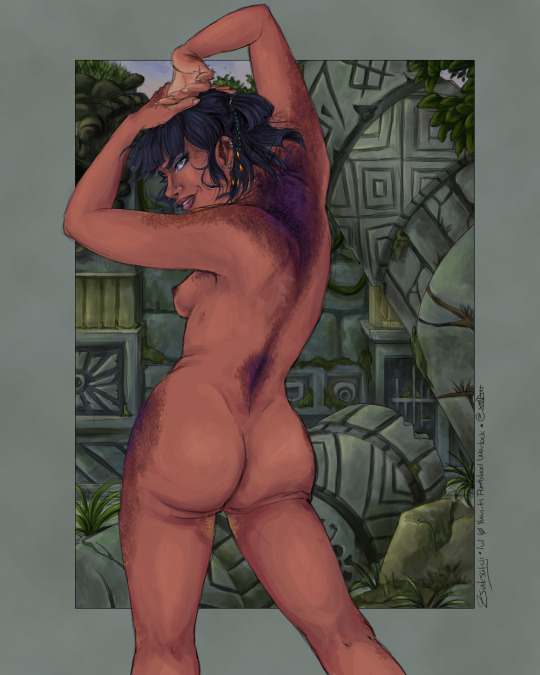
In reality, Zmija is not a human traveler from Zemlya, because surprise! she's actually Zsaksatyi, a Chultian Yuan-Ti Pureblood under the command of Fenthaza. She worked as a bit of a double agent/interrogator within the Fane prior to her current assignment (hence her spell list's focus on information gathering, silent communication, and manipulation); she's been fleshing out her alternate persona for years and would occasionally pretend to be a captive and be thrown in one of those cells the party was in to get relevant information from the other prisoners, or assist others that were interrogating prisoners by more direct means (via Detect Thoughts). In-universe, the language she pretends to speak is mostly made up, and something she's been working on for years at this point—it's not a fully-fleshed conlang and she only has a couple hundred words and phrases but it's enough to be consistent and believable when she sprinkles it into regular speech. Since there's no real risk of running into anyone else from Zemlya (because it doesn't actually exist), it mostly didn't matter, and since there's actual meaning behind the words she does have, in theory it would have held up to a spell like Comprehend Languages as well. Out of universe, the language she speaks is an amalgamation of my own conlang stuff (which, like the in-universe version, is very limited and not complete) and various words and phrases pulled mostly from real-world Slavic languages (russian, croatian, hungarian, etc) with a little bit of Turkish thrown in when my English-only ear felt that it fit or when I had already used a word and needed another word for the same thing. Zsaksatyi (pronounced dzahk sot-YEE) is the only name/word in the whole mess that doesn’t actually mean something somewhere, and was a combination of syllables from an online Yuan-Ti name generator that I kinda liked together. If she had ever been outed, I would probably have come up with something a little less cumbersome for me and my (almost certainly wholly monolingual) D&D group to say... but she didn’t, so Zsaksatyi it stays!
She very much looks up to Fenthaza and almost idolizes and worships her—if she ever had to choose between Fenthaza or Dendar, things might have gotten a little bit rough for her (possibly no matter which way she ultimately jumped, though I imagine Dendar's vengeance would be more immediate, if Dendar's a hands-on sort of patron). Thankfully (for her), there was very little risk of that given that the party had left Fenthaza on reasonably neutral terms (having already helped her oust Ras Nsi from his position of power in the Fane and the party having essentially marked that dungeon as “cleared”). Fenthaza had sent her to scout the Tomb of the Nine Gods and locate (or steal) an artifact known as the Black Opal Crown, which will allow the Night Mother to emerge into the world. The group actually came across the crown pretty soon after Zmija (and our other new character, a firbolg druid named Mei Ren who replaced our cleric, Amara) joined them, but the party couldn’t figure out how to get it out of the room it was in and Zsaksatyi was content that it would be safe from both our group and other adventurers there while she found her way back to the Fane (though she Sent the location to Fenthaza in case she wasn’t able to make it back). That was actually like, halfway through the session right after she’d been introduced so having her sneak off that fast would have been absolutely wild, so I kept playing her as Zmija and while there were myriad opportunities for her to be discovered—including a hallway where any non-magical non-living thing got evaporated, up to and including clothing—she never was. The fact that the only spells she ever used spell slots on were Hex, Counterspell, and Identify never really got commented upon, because prior to her joining the party we didn’t have a source for any sort of utility magic and we’d been feeling the lack for a while. She was a lot of fun to play just as Zmija once I got the hang of her, but the hidden agenda that only our DM & I knew about was an extra layer of fun, too. It would have been neat to see how the party reacted to a reveal, but unless Jim wants to take us back to Chult to actually deal with the Night Mother’s return (because without having to keep up appearances and alignments, I’m pretty sure I could have gotten that crown out of there even before the weird teleport-defying magic of the Tomb got turned off), her story is over for us—taking her outside of the setting she was designed for would be weird... plus we already have two warlocks (well, one and a half) in a party of four PCs; adding a third would be a little bit bizarre, I think.
Her more Yuan-ti features include scales down her spine and across her shoulderblades, on the backs of her hands, and on her hips and thighs—mostly in reds, oranges, and browns, but as she increases in power and connection with the Night Mother, more of them are darkening to Her blue-black; it started right at that spot between the shoulderblades where you always picture being stabbed in the back, and has expanded from there; I imagine by level 20 all of her scales would be that blue-black and may have encroached further on the more human-y leather bits, probably encroaching on her face at the last, which would make being a spy a lot more difficult (even moreso than wearing as much clothing as she already does) but I guess at level 20, do you really need to be sneaking around pretending to be human?

In direct sunlight or other very bright light, her pupils constrict to slits, which is the real reason for her heavy eye makeup—between the distraction of it and the (somewhat exaggerated) squinting that such light induces, it often goes unnoticed, as it did with her character portrait (although to be fair to my party, Alexus also has slit eyes because that’s one of the traits of elves and half elves in D&D, and also I’m not sure if they ever saw her portrait any larger than 150x150 or whatever Roll20 shows them at). Both her top and bottom canine teeth are sharper, longer, and narrower than is typical for humans, and she is careful not to grin too widely and will cover her mouth when she laughs or yawns, whether she is in disguise or not. That part I’ve never drawn though, so I can’t really point to that as something the party overlooked, heh. In hindsight, I wish I'd given her more/heavier snake features but even the official art for Yuan-Ti player characters are very light on them and getting around the differences between human and yuan-ti racials without tipping off the party was hard enough as it was—I took the 120 feet of magic-ignoring darkvision invocation to disguise the fact that she innately had darkvision, I never used my racial spells and abilities unless I was willing to “use” a spell slot on them and had another plausible way to have obtained them, the one time I got hit with a poison ability (which she was immune to) I spent a lot of time “figuring out the math” on how much HP I had to drop, etc. I also wish I’d given her darker skin, as she is supposed to be Chultian but she is significantly lighter than all the NPCs we came across. Then again, I’m as white as a sheet soaked in bleach so there’s something weird about me RPing folks of colour regardless (especially given her fake backstory, agh agh agh) so yeah. Really enjoyed her, don’t regret her, will not ever play her again rofl
In our very last session of Tomb of Annhiliation, the party—fresh off the victory over the big bad lich whose name I can never spell and his weird world-eating fetus—headed back to Port Nyanzaru via the Aarakocra village of Kir Sabal, which the previous variant of the party (of whom only Thokk remained alive and mobile enough to talk to them) had helped out significantly earlier in the campaign, unlocking a flying ritual that we were like “man we’re not coming back here if we’re gonna use it we gotta do it now” to get us the rest of the way to the port. En route, Zmija tried to leave the group and rolled a secret 15 Stealth roll... contested by 17 and 18 perception rolls from Mei Ren and Thokk, but as she wasn’t carrying much of the party’s stuff and it was the end of the campaign, they kinda just let her give some line about seeing them again in the future maybe, the Mother’s will is unknowable, etc etc. I think if Duf and Kattii didn’t know that I wanted Alexus back as badly as I did and that we were like twenty minutes (real time) away from actually getting him back, they might have considered that more suspicious than they did.
Pronunciations (and translations): (mostly C&Ped from her bio, which is the only part of her character sheet I can still access on Roll20)
Zmija Yilan: zMEE-ah yee-LAHN. Because I'm subtle as hell, that's Croatian/Russian/Ukranian (first name) and Turkish (last name) for "snake/serpent," according to the internet. What do you mean Remus Lupin is a werewolf?!
Matrymriy: mah-tRRuh mRREE (Rs are rolled). Matrymriy is Zmija's claimed patron—one of five major Zemlyashan dieties—but she'll state that she doesn't know the name that she goes by in the local dialect. That's only partly true, of course—мати мрій is Ukranian for "Mother of Dreams" (at least according to google translate), which is close enough to her patron's actual names and titles (Dendar, the Night Mother) that she can get away with it without actually raising suspicions about the true source of her powers. She'll also do that thing where if someone tries to say the name back to her she'll "correct" them by saying it exactly the same four or five times and then "give up" and accept whatever "butchered" version the speaker comes up with, except she'll do it even if they're actually saying it perfectly correctly. She may do this with her own name as well (sorry, Jim. And Duf. And Dustin. And Kattii. And Kattii's coworker, if he ever joins us and I'm still playing this character by then, lmao.) (2021 addition: and literally everyone who has a name that isn’t typically pronounced by us English-only plebians, I am so sorry I’m not better at your language)
Zsaksatyi: dzahk sot-YEE. Zmija's real name, when she isn't pretending to be a human. That doesn't mean anything as far as I know, it was just a combination of some of the syllables the random Yuan-Ti name generator was coming up with that I liked (which is also where "Itszella" was from), lol. I may end up changing it to be less cumbersome at some point, unless it comes up before then and ends up written in stone, but I'm on a bit of a time crunch for the moment.
Zemlya: zem-lyah. If pressed for more detail on where in Zemlya she's from (e.g. by someone pretending to know details about her country), her home town is Fal'shyva (fall-sheh-VAH), southeast of the capital of Hayali (HI-yah-LEE) and just north of the port city of Farazi (fah-ra-DZI), which is where she originally sailed from seven years ago. фальшива земля is Ukranian for "fake land," Hayali is Turkish for "imaginary," and Farazi is Turkish for "hypothetical," lol.
Proverbs & (approximate) Pronounciations: (if I recall correctly, asterisks indicate ones I had used, so I didn’t repeat myself too frequently)
Wziąć się w garść (zvun shih garsch): lit. take the self into the fist (polish), pull yourself together Галопом по Zemlya (gal-OH-pohm poe zem-lyah): lit. galloping across Zemlya (russian), to be hasty/haphazard. * У кого немає собаки, полює з котом (Ooh koe-hoe meh-MIGH-eh soe-BAH-kay, poe-LOO-yay koh-tome): lit. who does not have dog, hunts with cat (ukranian, original proverb is portugese), make do with what you have. Z choinki się urwałaś? (dzi hoink-E she urr-vahl-wash): lit. did you fall from a Candlenights(aka Christmas) tree? (polish), you are obviously not well-informed; are you dumb? * Mi o vuku (MEE oh voo-koo): lit. to talk of the wolf (croatian), speak of the devil. * Thalai muzhuguthal (tha-LIE MOOz-GOO-thal): lit. pour water over someone's head (tamil), cut off a relationship. * Хоть кол на голове теши (coat-coal nah gohl-ehvee teh-SHEE): lit. you can sharpen an axe on this head (russian), a very stubborn person.
Other Languages Are Hard Today, Let’s Just Proverb It In English:
Cat's Forehead (japanese): a tiny space, usually used humbly to refer to owned land. It fell between chairs (swedish): group work that everyone assumed someone else would do, and didn't get done as a result * It gives me a beautiful leg (french): fat lot of good that'll do me Drown the fish (french): avoid a subject by talking about anything and everything else, confuse the issue In a river with piranhas, the alligator swims backstroke (brazil): protect your weaknesses * Accusation always follows the cat (iraqi): it's easy to blame someone who can't defend themselves The honey only sticks to the mustache of he who licked it (arabic): he who smelt it, dealt it * A hungry bear does not dance (greek): the reward must be worth the cost (or at least exist) * The crayfish sides with the crab (korean): people who have a lot in common stay friends * If you can't live longer, live deeper (italian): get the most of your time * A spoon does not know the taste of soup (welsh): intelligence is not wisdom Examine what is said, not who speaks (arab): don't take things at face value * Turn your face to the sun and the shadows will fall behind you (new zealand): have a positive outlook He who does not travel, does not know the value of men (moorish): wide experience is gr8 Do good and throw it in the sea (arab): don't expect anything back from kindness * Shared joy is a double joy; shared sorrow is halved (swedish): friends make things better If you want to go fast, go alone. If you want to go far, go together (african): strength in numbers, speed on your own.
6 notes
·
View notes